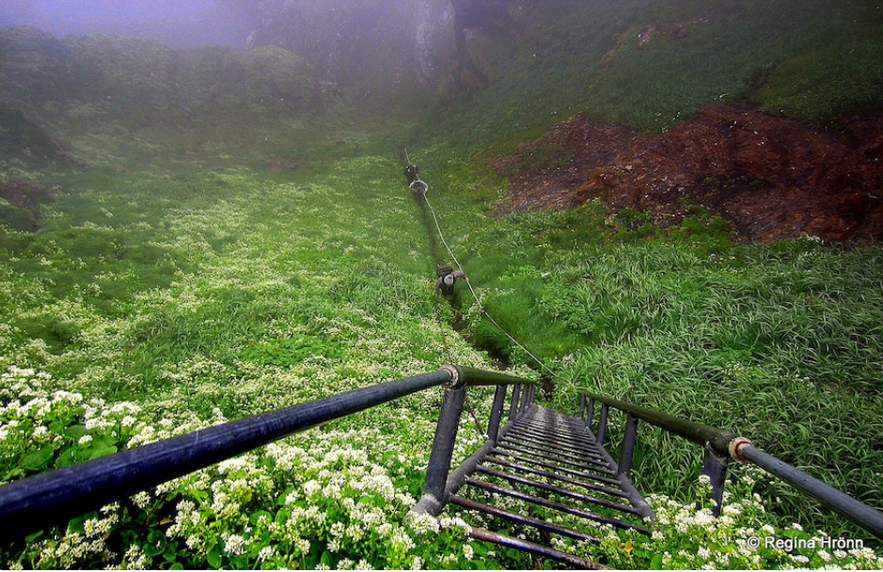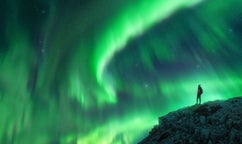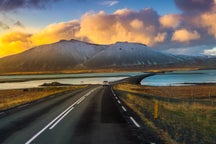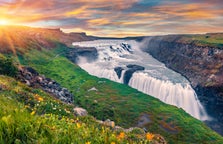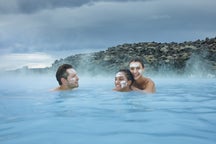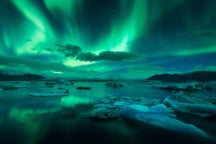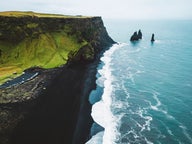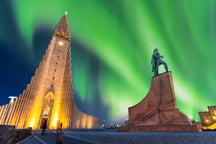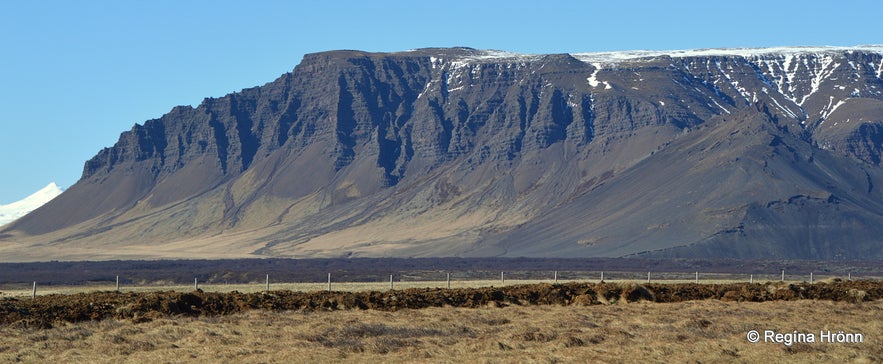
In this travel blog, I want to tell you about Grettir the Strong Ásmundarson, whom we read about in the Saga of Grettir and his 3-year stay in the triangular-shaped Grettisbæli in Mt. Fagraskógarfjall in Hítardalur valley.
Top photo: Mt. Fagraskógarfjall and Grettisbæli
 Mt. Fagraskógarfjall and Grettisbæli - Staðarhraunskirkja church in the foreground
Mt. Fagraskógarfjall and Grettisbæli - Staðarhraunskirkja church in the foreground
Grettir sterki - Grettir the strong (approx. 996) was the longest surviving outlaw in Viking times in Iceland, and we Icelanders root for him while reading his saga, which was written in the 14th century.
Grettir was an outlaw for almost 20 years, the maximum penalty for outlaws, even though we cannot find any old laws confirming this.
But I guess it was thought to be a penalty enough to survive as an outlaw for 20 years, through the cold, dark winters in my country.
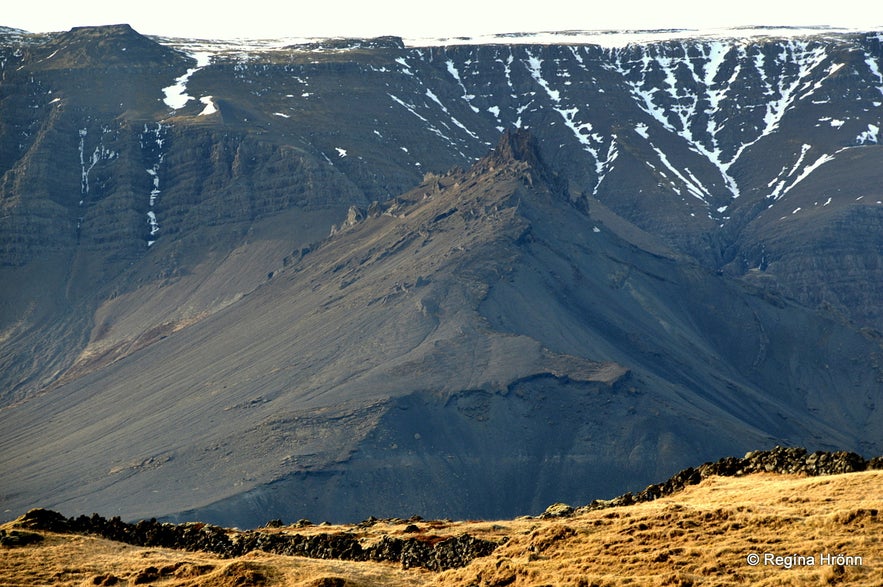 Mt. Fagraskógarfjall and Grettisbæli - I zoomed in on Grettisbæli, but will try to hike on it next summer.
Mt. Fagraskógarfjall and Grettisbæli - I zoomed in on Grettisbæli, but will try to hike on it next summer.
For 3 years, Grettir had a lair in Grettisbæli, by Mt. Fagraskógarfjall, in the Hítardalur valley.
Björn Hítdælakappi from Bjarnar saga Hítdælakappa allowed Grettir to stay in the mountain, but not everybody was happy to have an outlaw staying so close to their farm.
It was not easy being an outlaw in Iceland, having to find food while people were hunting you like prey.
And it was especially not easy for Grettir, who was very afraid of the dark ever since he killed the ghost Glámur, who haunted and killed people and animals in Vatnsdalur valley in West Iceland.
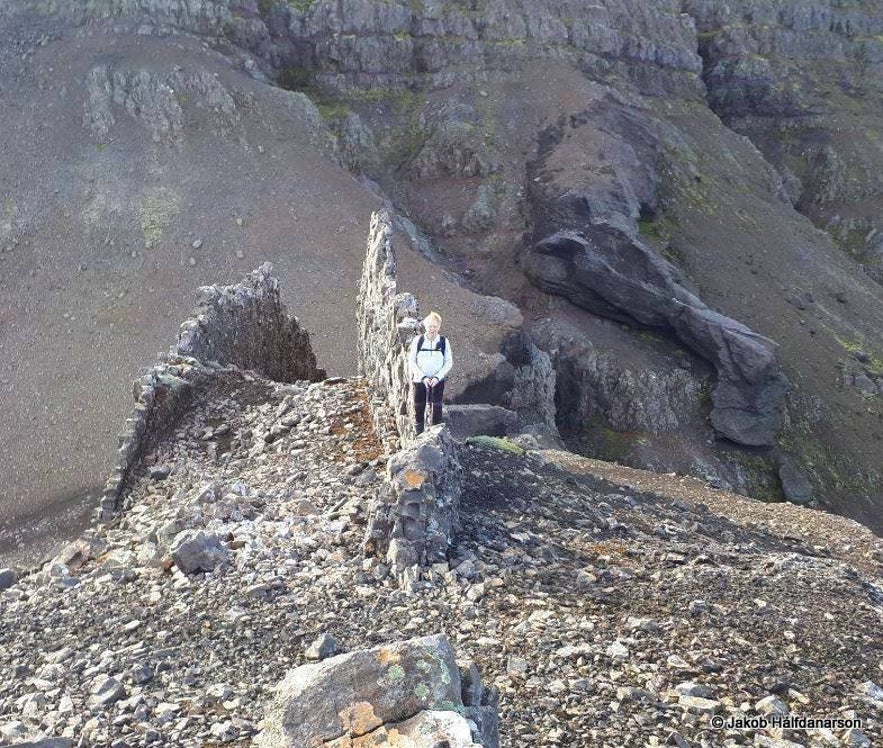 My father-in-law, Jakob, hiked on Grettisbæli and allowed me to use his photos for my travel blog
My father-in-law, Jakob, hiked on Grettisbæli and allowed me to use his photos for my travel blog
Grettir lived at Bjarg in Miðfjörður in North Iceland, near Vatnsdalur, and his great-great-grandfather was Ingimundur gamli, who had settled in Vatnsdalur.
You can read about Ingimundur and his descendants in the Vatnsdæla saga, which is also a fascinating saga.
When Grettir was fighting Glámur, Glámur fell on his back, and the moon lit up his face, and he gave Grettir a sharp look. Grettir was 20 years old when he fought Glámur, and he later said this was the only sight that had startled him in his life.
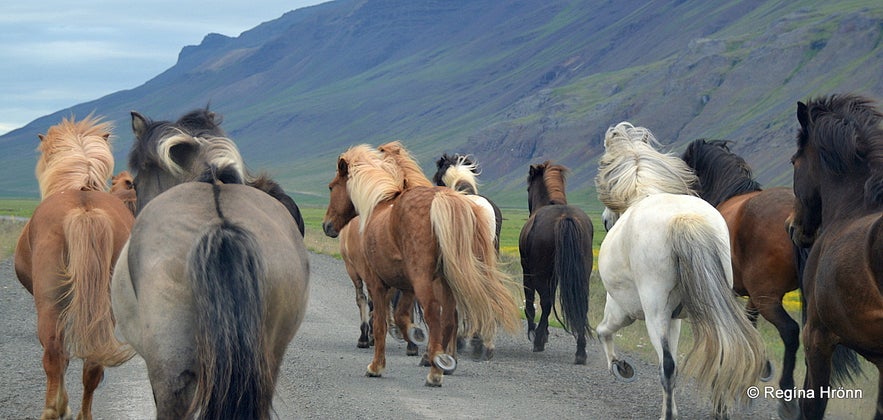 Horses in Vatnsdalur in North Iceland, where Grettir killed Glámur
Horses in Vatnsdalur in North Iceland, where Grettir killed Glámur
Glámur put a spell on Grettir that his eyes would haunt him for the rest of his life, and he would find it difficult to be alone. And from then on, when darkness fell, Grettir said that he saw all kinds of phantoms.
So we can imagine what it must have been like for Grettir to be alone for years in his lairs, especially in limited daylight during the wintertime.
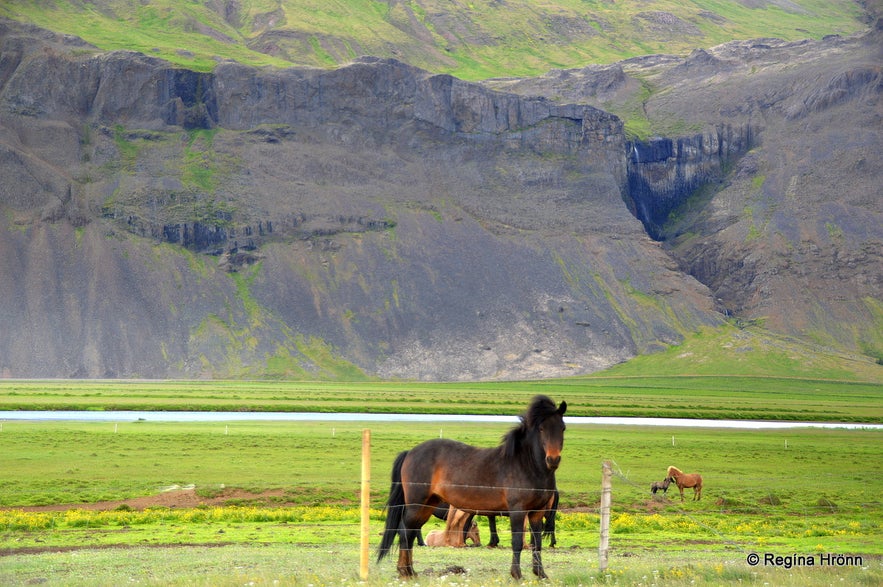 In the beautiful Vatnsdalur valley in North Iceland
In the beautiful Vatnsdalur valley in North Iceland
After Grettir managed to kill Glámur, he was considered to be the strongest and most valiant man in Iceland.
But Glámur, before he died, put another spell on Grettir, that he would not grow any stronger than half the strength he was meant to have, that he would have no fortune in life and live a life of battle and misery.
From then on, everything went downhill for Grettir.
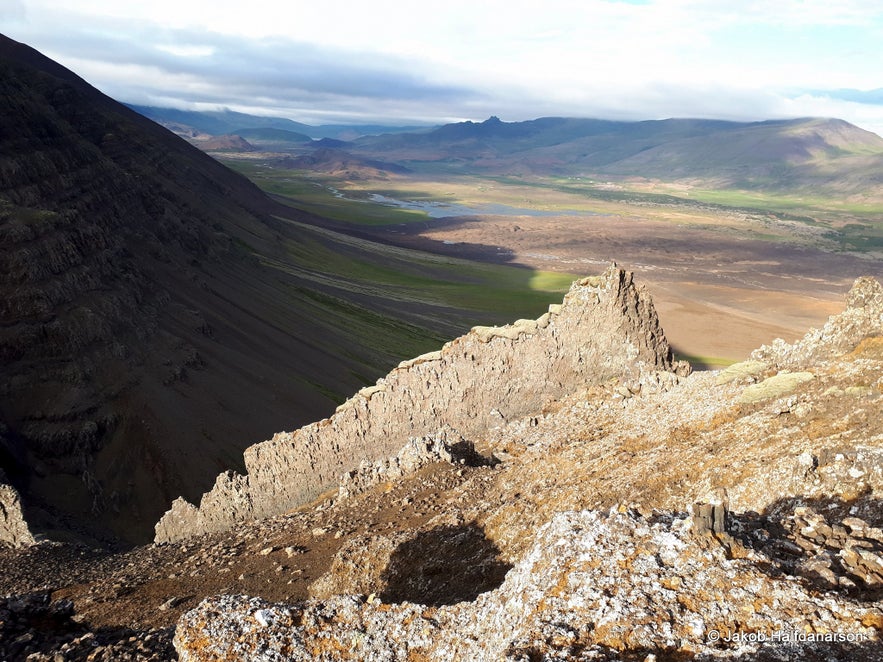 The view of Hítardalur valley from Grettisbæli, where you can see the avalanche that fell in 2018. Photo credit Jakob Hálfdanarson
The view of Hítardalur valley from Grettisbæli, where you can see the avalanche that fell in 2018. Photo credit Jakob Hálfdanarson
I want to tell you the story of Grettir in Hítardalur valley, as it is one of my favourite accounts in the Grettis saga.
It is very graphic, and every time I drive to Snæfellsnes, I think about this story.
The story of Grettir's time in Hítardalur valley is told in the Saga of Grettir the Strong, chapters 58-60.
Some time into Grettir's outlawry, after he had stayed for many years in different lairs in Iceland, Grettir approached Björn Hítdælakappi and sought shelter with him, as it was known that Björn often sheltered outlaws.
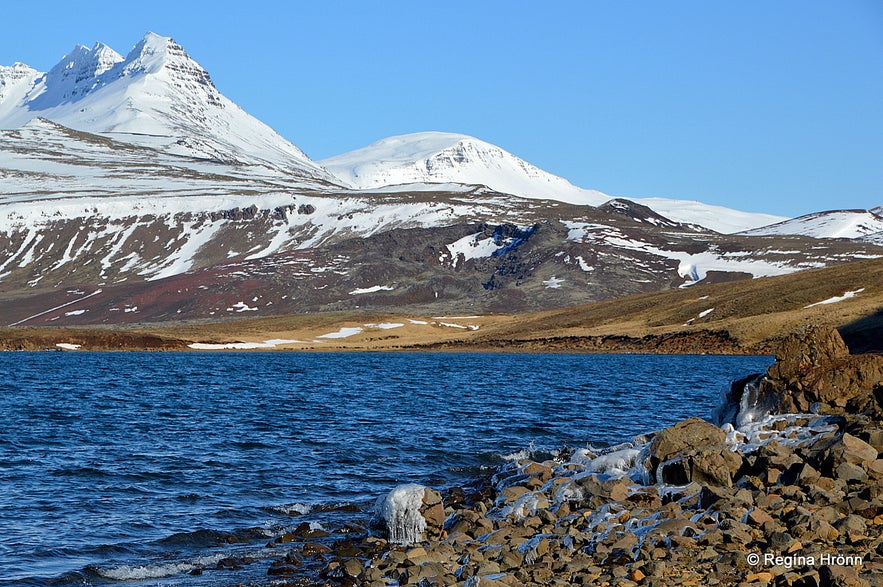 Björn Hítdælakappi had another farm by Lake Hítarvatn
Björn Hítdælakappi had another farm by Lake Hítarvatn
Björn told Grettir that he could stay in a protruding mountain in Mt. Fagraskógarfjall - from then on called Grettisbæli.
Grettisbæli is a 426-meter-tall triangular-shaped mountain top protruding from the southeast part of Mt. Fagraskógarfjall.
In the 19th chapter of Bjarnar saga Hítdælakappa, we are told that above the farm Vellir, where Björn lived (he had two farms for some time, also at Hólmur by Lake Hítarvatn), Grettir hid in Grettisbæli.
Grettir is only mentioned in the 19th chapter of that saga. The main story is told in the Grettissaga, one of the longest of the Icelandic sagas.
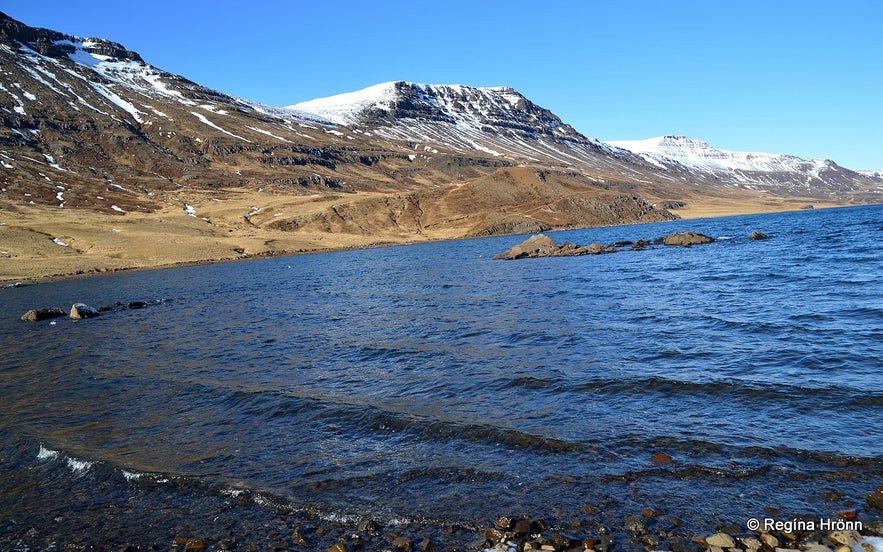 Björn Hítdælakappi was killed here at Hvítingshjallar by his enemy Þórður from Hítarnes
Björn Hítdælakappi was killed here at Hvítingshjallar by his enemy Þórður from Hítarnes
Björn and Grettir are said to have tested their strength and turned out to be equally strong, which proves that Björn was very strong, as Grettir was the strongest man in Iceland at that time, ever since Ormur Stórólfsson and Þórálfur Skólmsson stopped testing their strength.
Grettir lived in Grettisbæli for three winters without being caught, and a very high reward was promised to the one who would be able to catch Grettir.
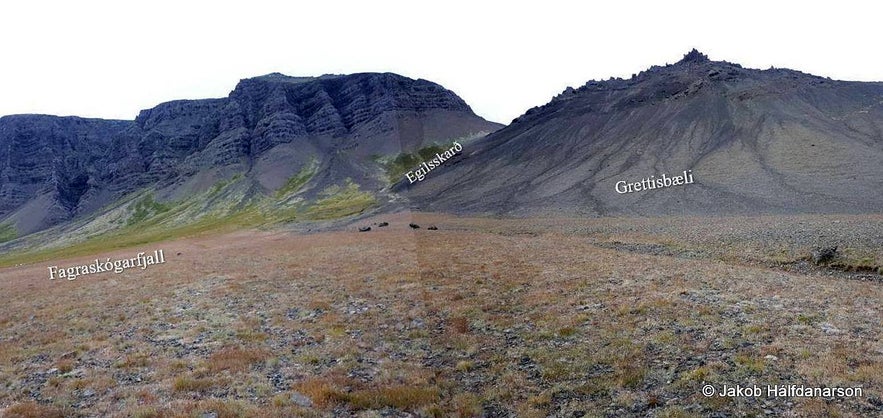 My father-in-law marked the names of the mountains and the mountain pass
My father-in-law marked the names of the mountains and the mountain pass
He stole sheep from the farmers, so they were not happy about him staying in the valley.
Now introduced to the story is Gísli Þorsteinsson, a strong, self-praising man.
Gísli had been out sailing for the winter, and upon hearing that Grettir was hiding in Grettisbæli lair in Hítardalur valley, he wanted to try to catch Grettir.
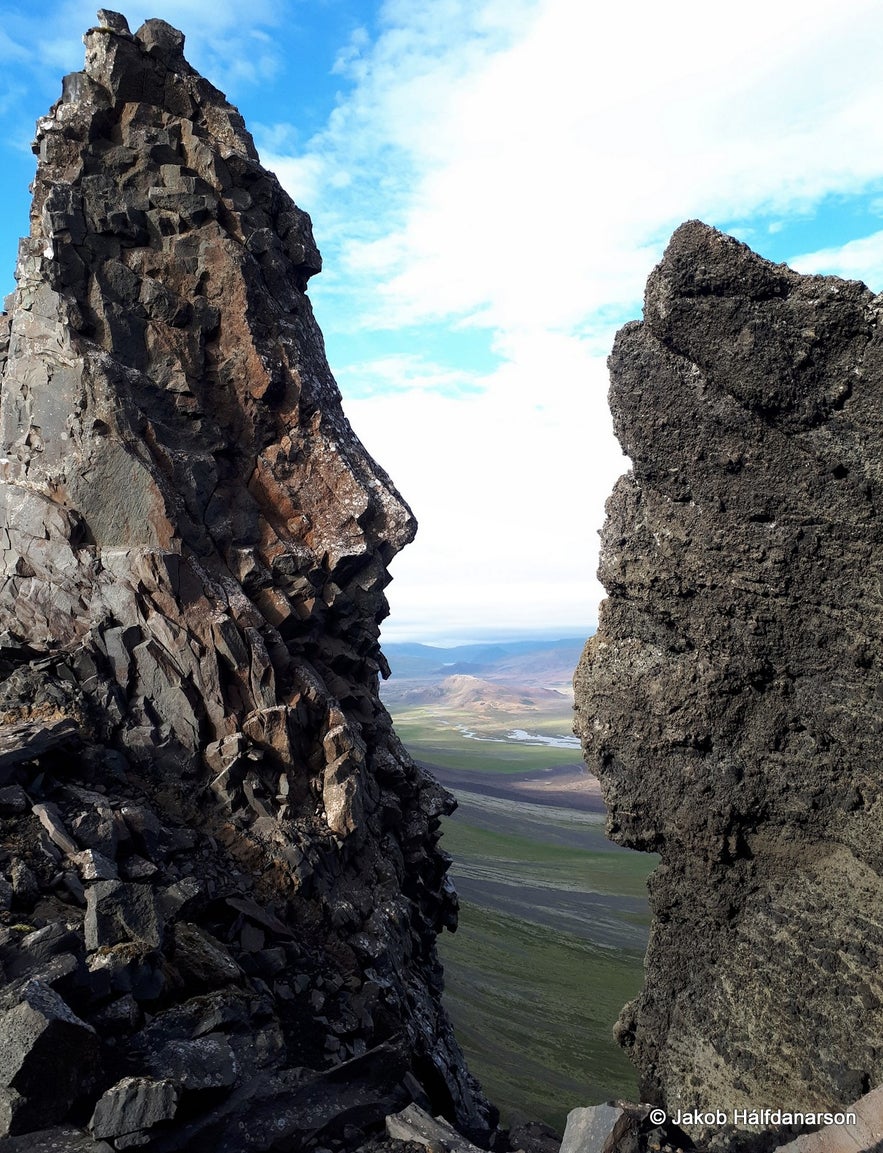
Did Grettir spot Gisli and his men from here? Photo credit Jakob Hálfdanarson
He conversed with Þórður from Hítarnes, the enemy and slayer of Björn Hítdælakappi, and told him of his plan to catch Grettir.
Björn's friends overheard this plan, and Grettir was warned. Gísli arrived with two other men, all dressed in colourful clothes and enameled shields, to show Grettir that they were men of importance, not average wayfarers.
When Grettir saw these men, he came running down the mountain and grabbed a bag of clothes from Gísli's saddle.
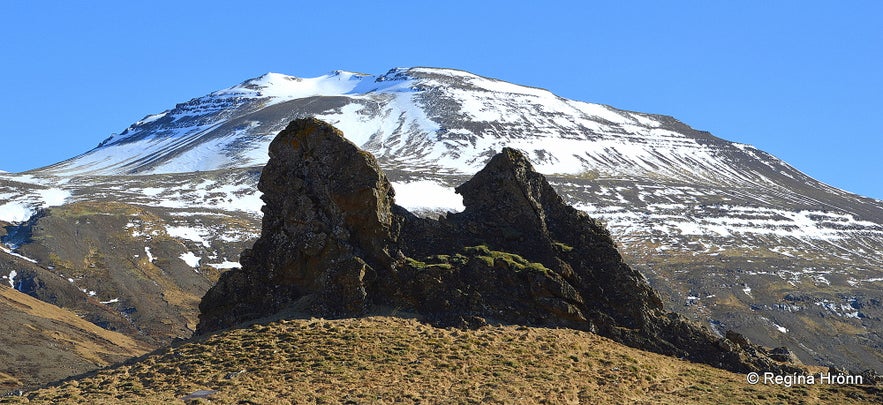 Hítardalur valley
Hítardalur valley
They attacked him, and Grettir ended up killing Gísli's two companions, but Gísli himself threw his weapons and fled with Grettir following him.
Gísli was boastful but not the most courageous of men and had hidden behind his two companions, so Grettir didn't hold him in such high regard, as Gísli had wanted.
Gísli ran and ran from Grettir, shedding more and more clothes as he fled until He was left in his linen underwear, still frantically running westward with Grettir on his heels.
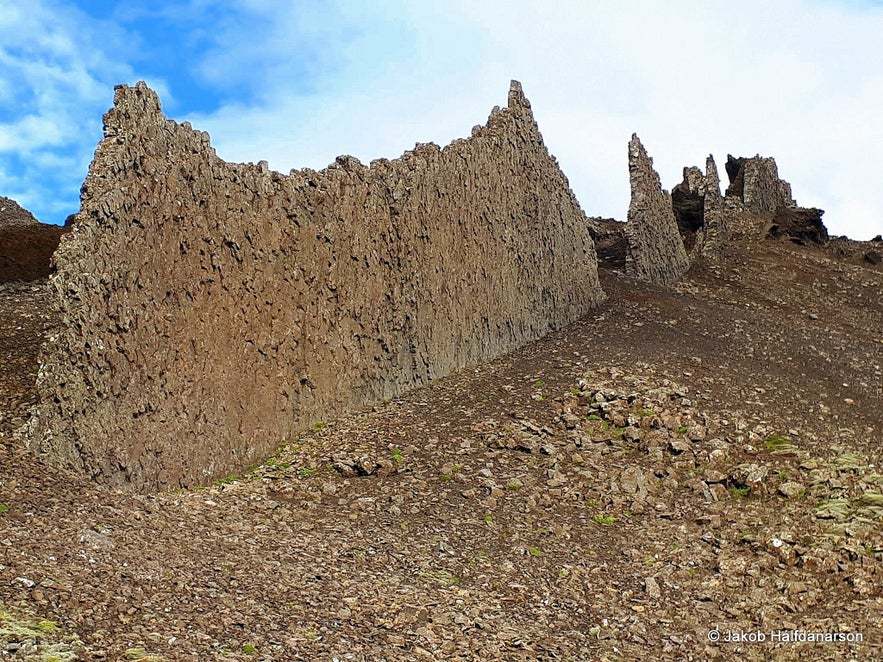 Huge dykes in Grettisbæli - photo credit Jakob Hálfdanarson
Huge dykes in Grettisbæli - photo credit Jakob Hálfdanarson
The story tells us (in the 59th chapter) that Grettir didn't run too fast to give Gísli a break.
While Grettir was leisurely running after Gísli, he picked up a big twig.
Gísli ran above Kolbeinsstaðir farm and ventured into the Borgarhraun lava field - see my travel blog about A Hike to the perfectly shaped Eldborg Scoria Crater on Snæfellsnes in West Iceland.
Gísli didn't stop until he reached the Haffjarðará river and was by now totally out of breath.
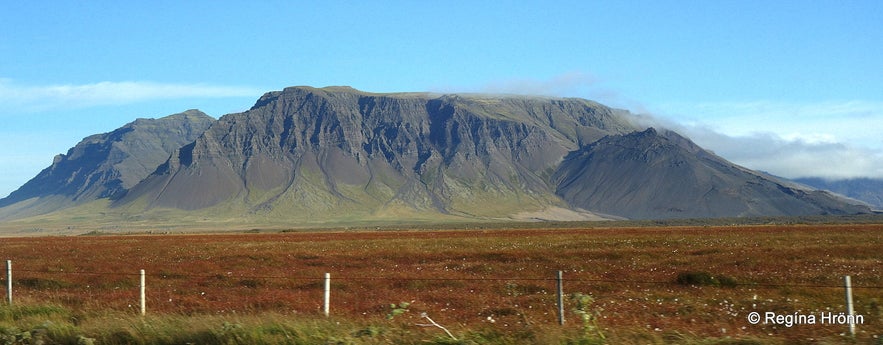 Mt. Kolbeinsstaðafjall is to the left - here you can see where Gísli ran, and Grettir chased him
Mt. Kolbeinsstaðafjall is to the left - here you can see where Gísli ran, and Grettir chased him
Grettir grabbed him as he was about to jump into the river, which was difficult to pass at this time of the year.
Grettir forcefully forced Gísli down on his knees and said: "Are you the Gísli who wanted to find Grettir Ásmundarson?"
Gísli answered: "I have found him, but I don't know yet how we will part, and take what you have already got (his clothes), but set me free."
Grettir said, "You don't seem to understand what I am telling you, and I have to teach you a lesson."
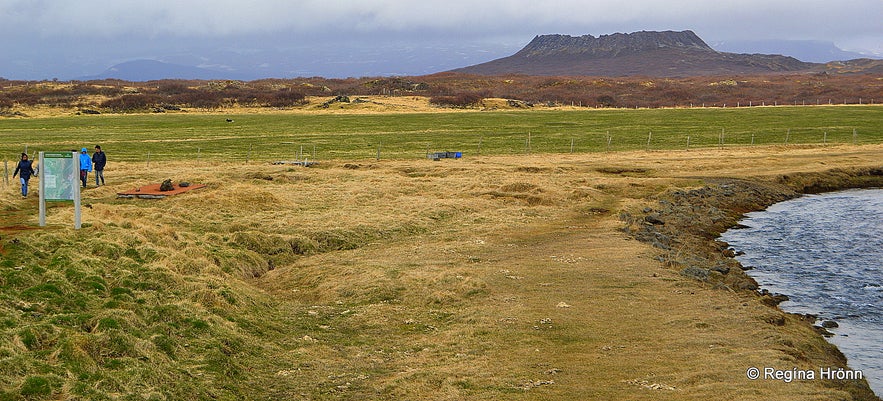 Eldborg crater - somewhere around here, Grettir chased Gísli - a bit further northwest of the crater
Eldborg crater - somewhere around here, Grettir chased Gísli - a bit further northwest of the crater
Grettir then pulled the linen shirt over Gísli's head and flogged him with the twig, on his back and both of his sides.
Gísli was wriggling, but Grettir skinned him and set him free. Gísli learned his lesson that day: you never mess with Grettir the strong.
Grettir returned to Grettisbæli and picked up the coloured clothes on his way back. Thus, Gísli lost his fancy clothes, which he had worn to show Grettir that he was dealing with important people.
And Grettir the strong got some new fancy, coloured (dyed) clothes to wear.
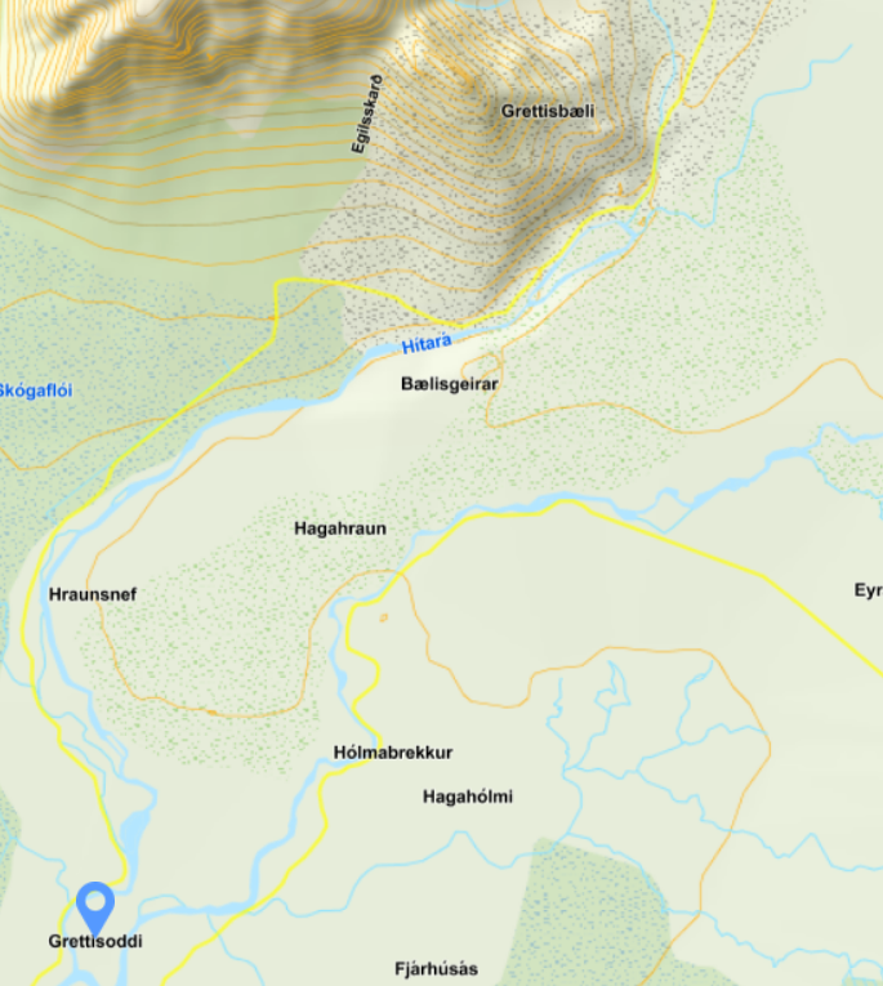
Grettir continued robbing farmers' livestock, so they wanted him gone from the mountain.
They asked Þórður Kolbeinsson from Hítarnes for help and attacked Grettir with almost 20 men, while he was herding the farmers' sheep.
There was a battle between them, and 10 men were killed and wounded, and in the end, they had to retreat. The spot where this battle took place is called Grettisoddi.
The farmers had had enough, and Björn Hítdælakappi lost many of his friends for allowing Grettir to stay on while their (and his) relatives were unrevenged.
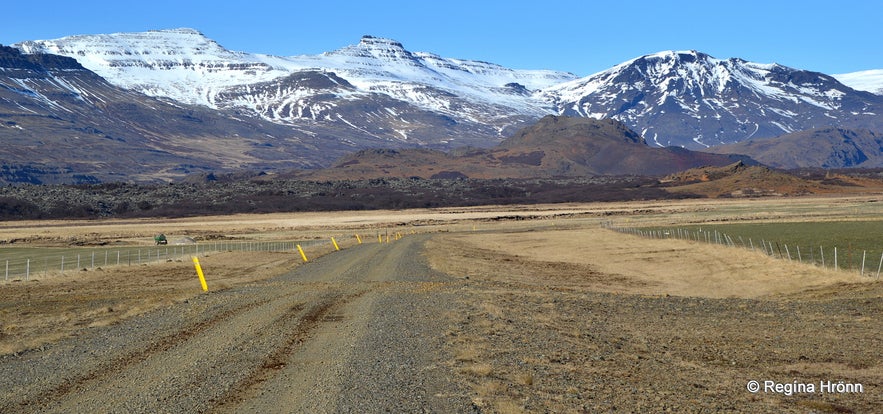 Hítardalur valley
Hítardalur valley
So Grettir left Grettisbæli and Hítardalur and went to stay with his friend Hallmundur, with whom he had stayed in a cave before arriving in Hítardalur.
I am going to tell you more about his former and later hiding places in the following chapters.
Why was Grettir sentenced to outlawry?
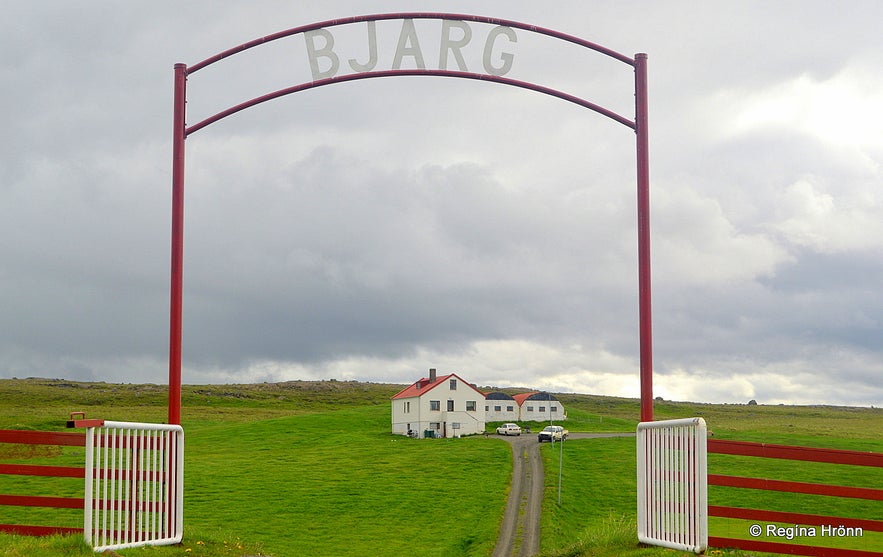 Bjarg in North Iceland - the birthplace of Grettir
Bjarg in North Iceland - the birthplace of Grettir
When Grettir was only a teenager (14), he was sentenced to exile for 3 years after killing a man for the first time, Skeggi by name.
They had quarreled over a haversack, which they had both lost.
The reason Grettir the Strong from Bjarg in Miðfjörður in North Iceland became an outlaw was that he was accused of starting a fire that killed 12 men, including two brothers from Garður in Aðaldalur valley in North Iceland, Þorgeir and Skeggi.
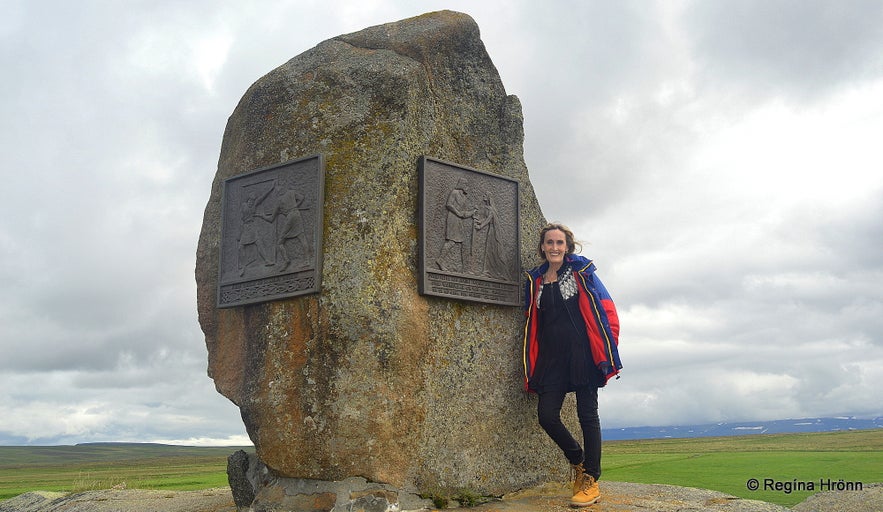 The memorial for Grettir's mother, Ásdís, at Bjarg, bas-reliefs by Halldór Pétursson
The memorial for Grettir's mother, Ásdís, at Bjarg, bas-reliefs by Halldór Pétursson
But Grettir was innocent, and it was all a mistake. Grettir only wanted to ask these men for some fire, as he had run out.
The men mistook him for a troll as he was wearing a cloak and was all wet when he entered the hut where they were staying.
They panicked and attacked him, and some of them hit him with firebrands.
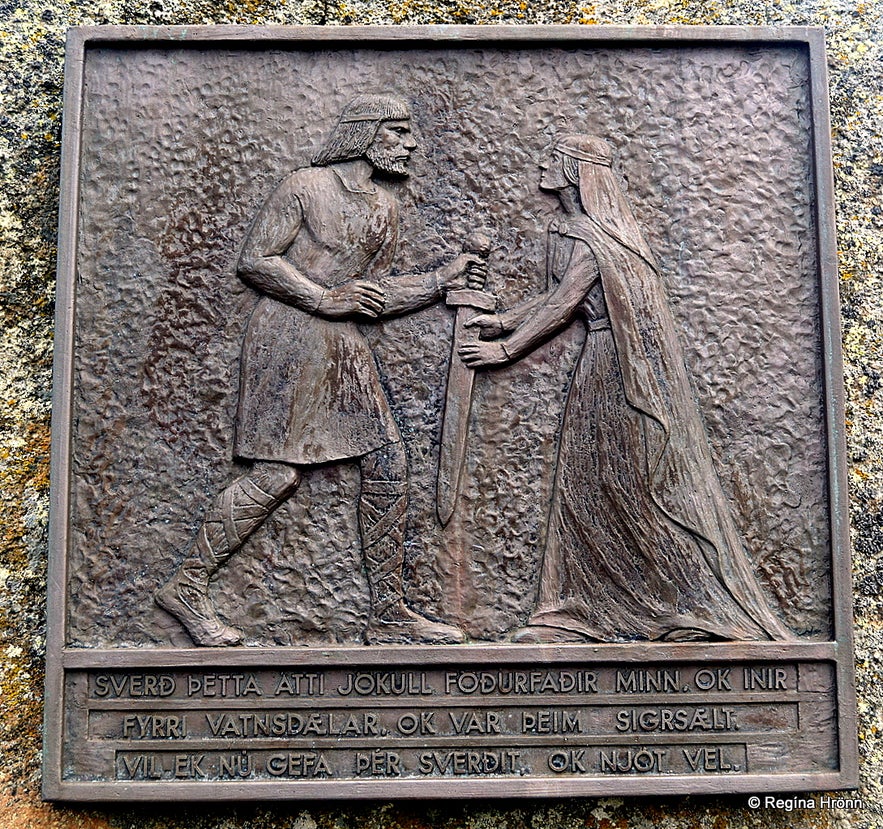 Ásdís gave Grettir the family sword from Vatnsdalur when he went to Norway
Ásdís gave Grettir the family sword from Vatnsdalur when he went to Norway
During this panic, the fire spread. And Grettir was believed to have started the fire that killed all these men, was treated like an outcast, and was said to be destined for misfortune (chapter 38 in Grettissaga).
This happened in Norway shortly after Ólafur Haraldsson became king, and Grettir and the other Icelanders wanted to greet the new king.
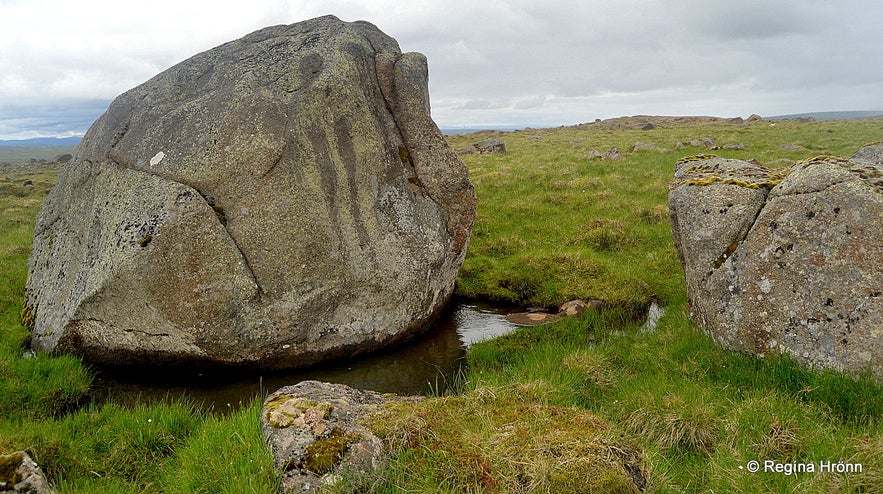 Grettistak rock at Bjarg - I think this is it, there were many rocks, but this one looked like Grettistak
Grettistak rock at Bjarg - I think this is it, there were many rocks, but this one looked like Grettistak
When Grettir returned to Iceland from Norway, he got the news that his father was dead, Þorbjörn öxnamegin had slain his brother Atli at Bjarg, and that he himself was an outlaw in the whole of Iceland for the fire raising in Norway!
Grettir had to avenge his brother Atli and killed Þorbjörn öxnamegin and his son. Such were the times. Honour had to be restored to the family.
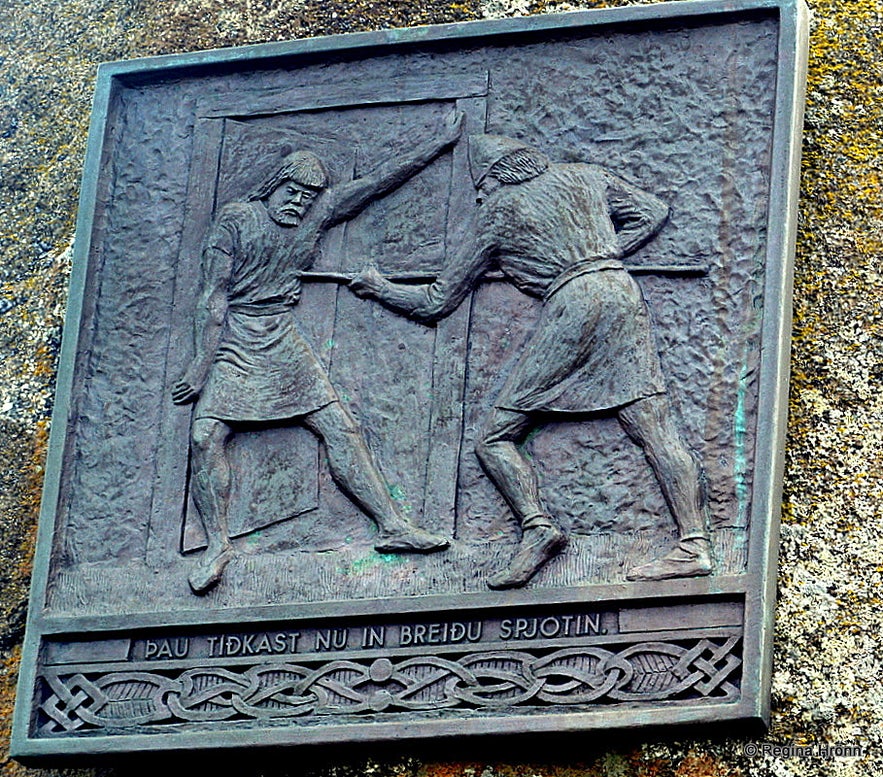 Þorbjörn öxnamegin put a sword through Atli at Bjarg
Þorbjörn öxnamegin put a sword through Atli at Bjarg
Þórir Skeggjason, the father of the two brothers from Aðaldalur, was instrumental in sentencing Grettir to outlawry, even though Grettir himself was not present to defend himself at the Althing!!
Grettir was only 25 years old at the time, and this was a heavy sentence to face.
And for almost 20 years, Grettir had to hide in Grettisbæli lairs or in the highland, but it was difficult for him to be alone, as he was so terrified of the dark.
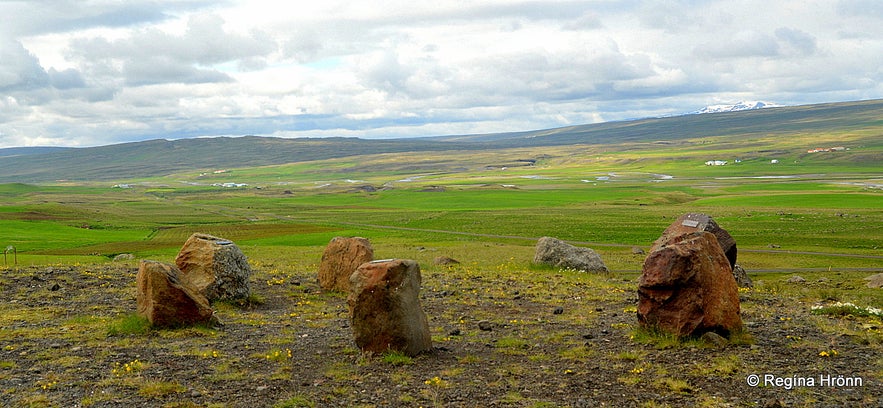 Rocks at Bjarg in Miðfjörður by the memorial of Ásdís, showing locations of events in Grettissaga
Rocks at Bjarg in Miðfjörður by the memorial of Ásdís, showing locations of events in Grettissaga
Being with other outlaws only meant trouble, as many wanted to kill him for the bounty on his head.
A lot of money was promised for Grettir's head at the Althing (6 merkur silfurs), which later increased to 9 when Þórir added to the amount.
Sometimes good people helped him or took him in, like Björn Hítdælakappi and many others around Iceland, such as his relative Þorsteinn Kuggason at Árskógar, but the majority did not want to risk helping him.
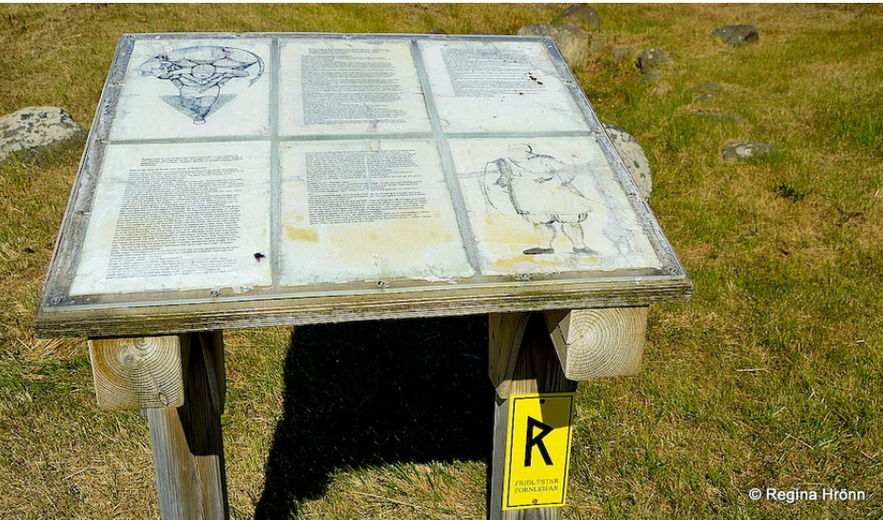
Chieftain Þorgils Arason at Reykhólar in the Westfjords saw pity on Grettir and sheltered him for one winter after he killed Þorbjörn and his son (chapter 50).
It is fascinating reading about Grettir's adventures at Reykhólar, including the account of him carrying a large bull on his shoulders.
I have written about Reykhólar and Grettir in another travel blog: 3 days of fun at Reykhólar in the Westfjords Region - Part 1
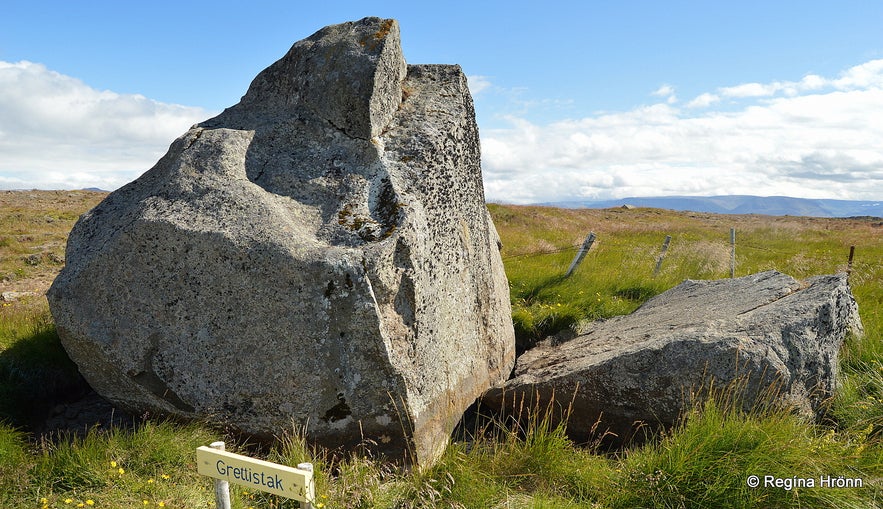 Grettistak rock at Reykhólar - there are many such rocks in Iceland that Grettir supposedly lifted
Grettistak rock at Reykhólar - there are many such rocks in Iceland that Grettir supposedly lifted
Þorbjörg digra - the portly in Vatnsfjörður in the Westfjords of Iceland saved Grettir from hanging after he left Reykhólar (52nd chapter).
Þorbjörg the portly, the lady of the Vatnsfjörður estate, and the wife of Vermundur hinn mjóvi, saved Grettir after he created havoc and plundered this part of the Westfjords.
By now, Grettir had become foolhardy, and the farmers (30 of them) were able to apprehend him and wanted to hang him.
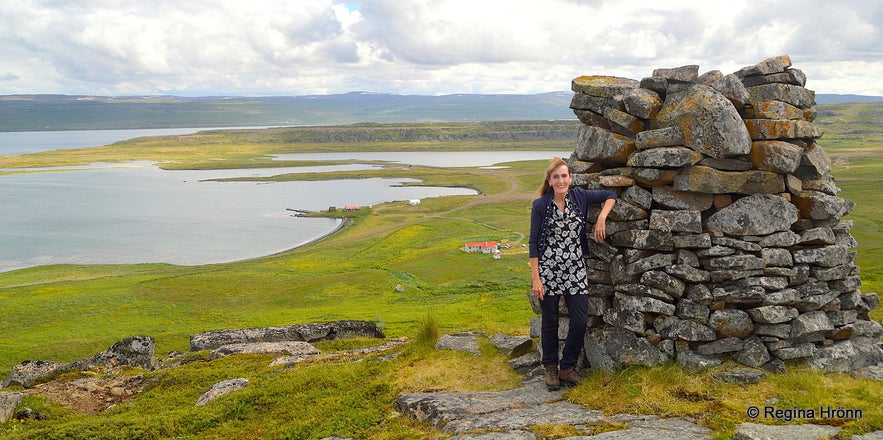 Grettisvarða cairn in Vatnsfjörður is huge
Grettisvarða cairn in Vatnsfjörður is huge
It was a close call for Grettir; nobody had wanted to keep him until the Chieftain Vermundur hinn mjóvi returned home, so the farmers were at a loss and decided to hang him.
Fortunately, Þorbjörg came to the rescue and took him in.
She made him take an oath that he would not disturb the peace of the Westfjords nor take revenge on the farmers if she were to save his life.
You can read about it in my travel blog: Vatnsfjörður in the Westfjords of Iceland - the Viking Estate and Grettisvarða Cairn.
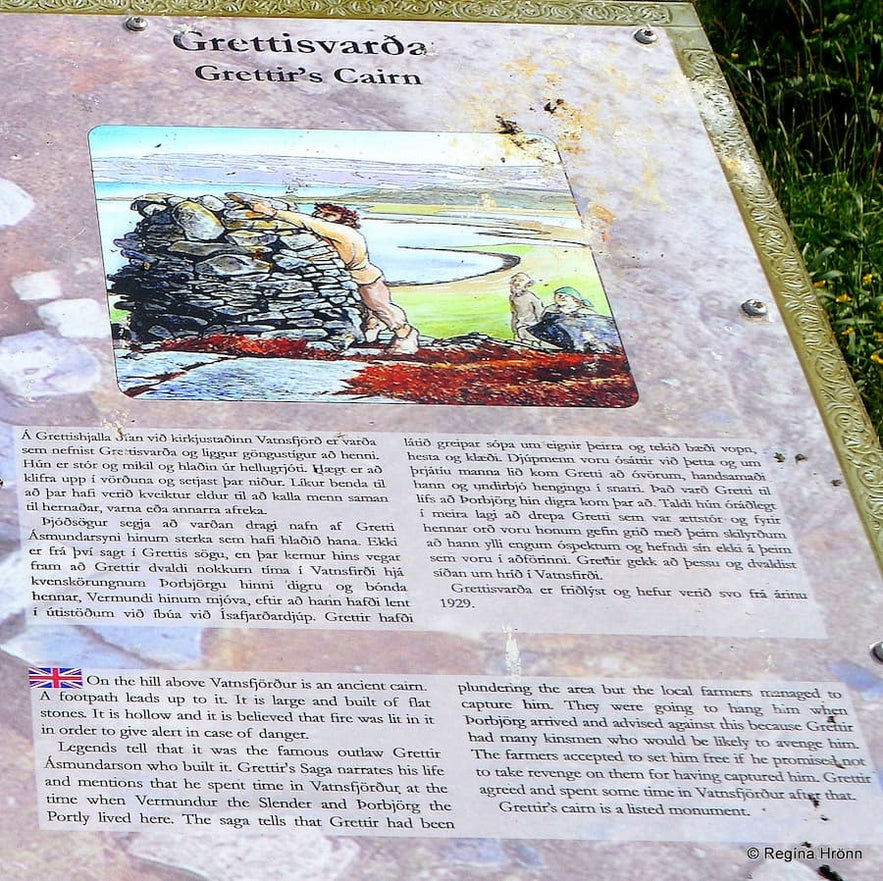 The information sign by Grettisvarða in Vatnsfjörður
The information sign by Grettisvarða in Vatnsfjörður
Þorbjörg was not your average woman, as she was not only married to Chieftain Vermundur hinn mjóvi from Eyrbyggja saga, but was also the daughter of Ólafur pá Höskuldsson from Laxdæla Saga and Þorgerður Egilsdóttir, who in turn was the daughter of Egill Skallagrímsson from Egil's Saga.
And her aunt was Hallgerður langbrók from Brennu-Njálssaga - the Saga of Burnt Njál.
I love how the Sagas intertwine. I have read them all and seek out the places in Iceland, where the sagas took place. I hope you enjoy travelling with me to these saga places :)
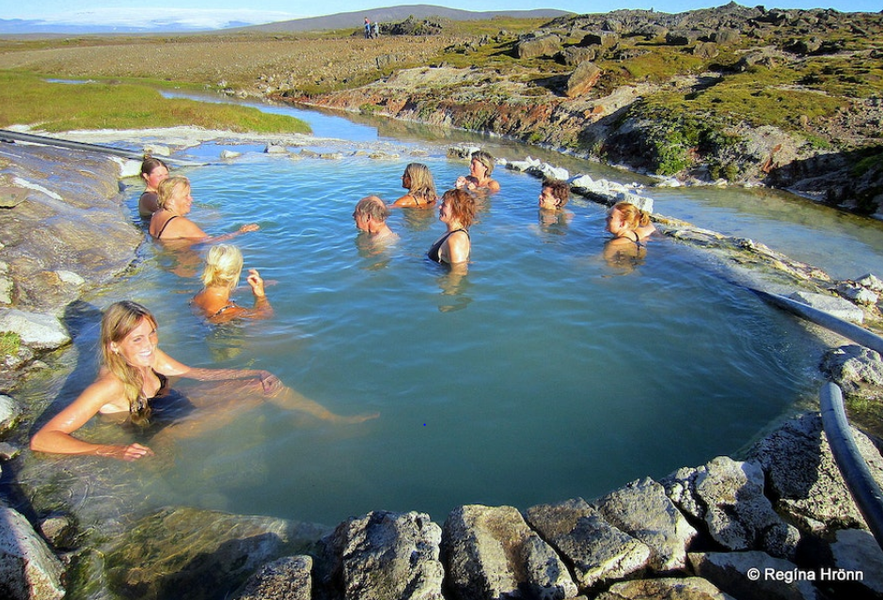
Grettir then stayed at Kjölur and robbed passers-by. At Kjölur, he remained at Dúfunesskeið, near the beautiful Hveravellir geothermal area, where he had access to hot water.
This area is nestled between two of Iceland's glaciers, Langjökull and Hofsjökull, and is accessible in the summertime.
One of the glacier tongues in Langjökull is called Baldjökull, or Balljökull in Grettissaga.
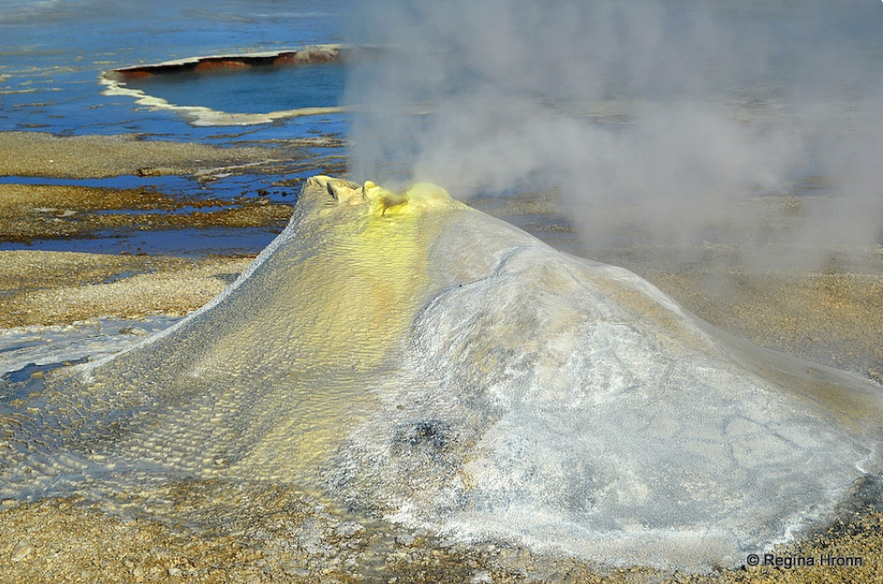
Later, in the 18th century, another well-known outlaw, Fjalla-Eyvindur, also stayed at Hveravellir with his wife, Halla. They were also outlaws for 20 years.
I have written another travel blog about Hveravellir - the beautiful Oasis in the Highland of Iceland, where you can see the beautiful hot springs and remnants from outlaw times.
While Grettir was robbing passers-by at Kjölur, he met a man who turned out to be of equal strength, if not stronger than Grettir. He was to meet this man again later on.
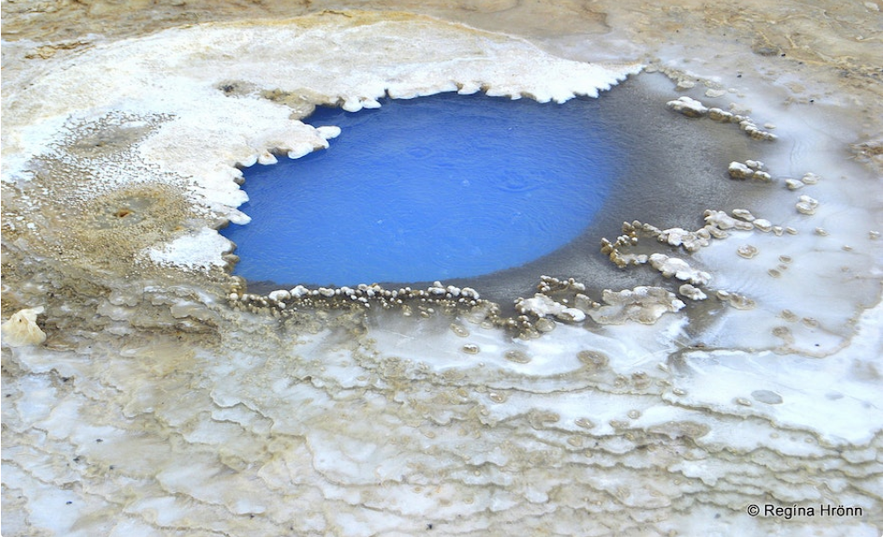
Next, Grettir moved further west and stayed for three winters by Fiskivötn on Arnarvatnsheiði heath in the highland.
He allowed outlaws to remain with him as he didn't want to be alone, but two of them tried to kill him.
There, he was attacked by Þórir at Garður, the father of the two brothers who had lost their lives in the fire in Norway. Þórir brought with him 80 men; 18 were killed, and many were wounded before they retreated.
A man came to Grettir's rescue and defended his back while he was under attack; this turned out to be the giant Hallmundur, whom he had met at Kjölur, and was his equal in strength.
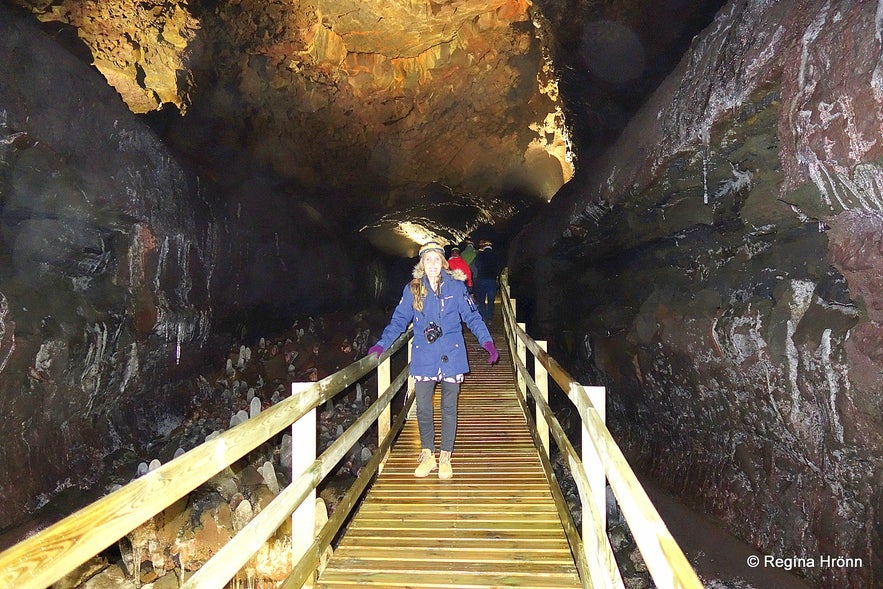 Did Hallmundarhellir cave look something like this? In Víðgelmir cave in Hallmundarhraun
Did Hallmundarhellir cave look something like this? In Víðgelmir cave in Hallmundarhraun
The last place Grettir stayed before coming to Hítardalur was Hallmundarhellir cave by Balljökull glacier, where the giant Hallmundur and his daughter lived.
Þórir continued to hunt Grettir down and sent men to kill him, and put a prize on his head. Revenge was expected in Iceland during the Viking Age to restore the family's honour.
And you were thought less of if you didn't avenge the slaying of a family member, and it was also believed that the dead person couldn't rest in peace until the family honour was restored.
This meant that there was an ongoing cycle of revenge in Iceland at that time.
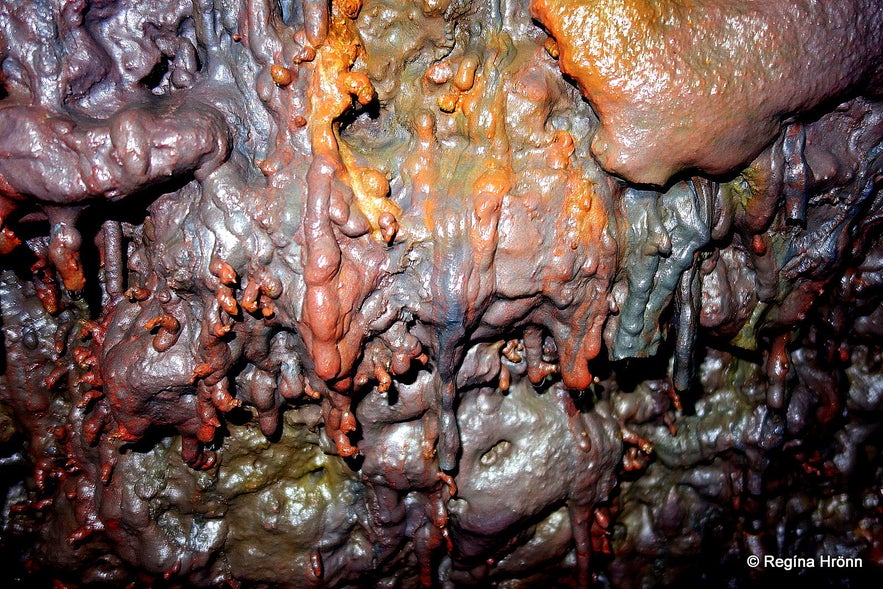 Extraordinary lava colours in Víðgelmir cave
Extraordinary lava colours in Víðgelmir cave
I wonder what Hallmundarhellir cave looked like.
In the Hallmundarhraun lava field, you will find several of Iceland's largest caves, like the colourful Víðgelmir cave, which you can enter with guidance, and Surtshellir cave.
Many of these caves are so colourful that you feel like you have entered an art gallery.
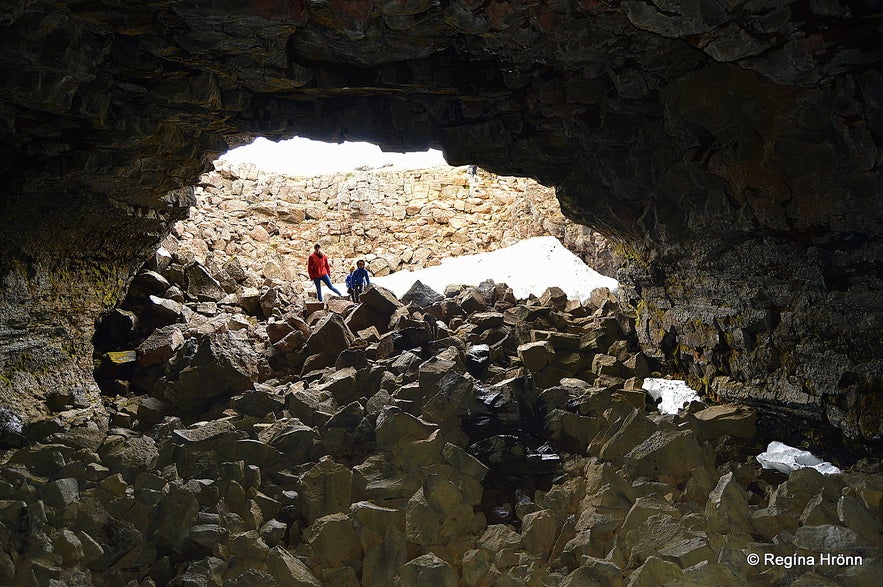 Surtshellir cave in Hallmundarhraun lava field - the longest known lava tube in Iceland
Surtshellir cave in Hallmundarhraun lava field - the longest known lava tube in Iceland
These caves are massive, and they are just the kind of hiding place you might imagine that outlaws would seek. Or trolls, for that matter.
Grettir hid in all of these places before seeking shelter in Grettisbæl in the Hítardalur valley.
Where did Grettir hide after he left Hítardalur valley?
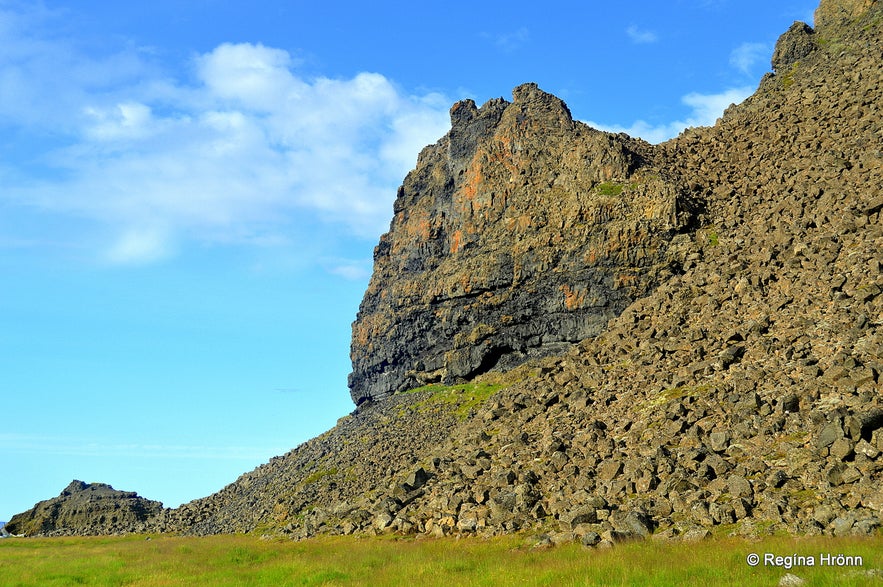 The protruding rock Grettisbæli in Mt. Öxarnúpur in northeast Iceland
The protruding rock Grettisbæli in Mt. Öxarnúpur in northeast Iceland
After leaving Hítardalur valley, Grettir stayed in several other places, including with his friend Hallmundur again, before seeking refuge for 3 years on Drangey island in Skagafjörður in North Iceland.
He stayed in a valley between Geitlandsjökull and Þórisjökull glaciers.
There, he found a flock of big, fat sheep and built a lodge. Grettir named the valley Þórisdalur after the giant Þórir who lived there.
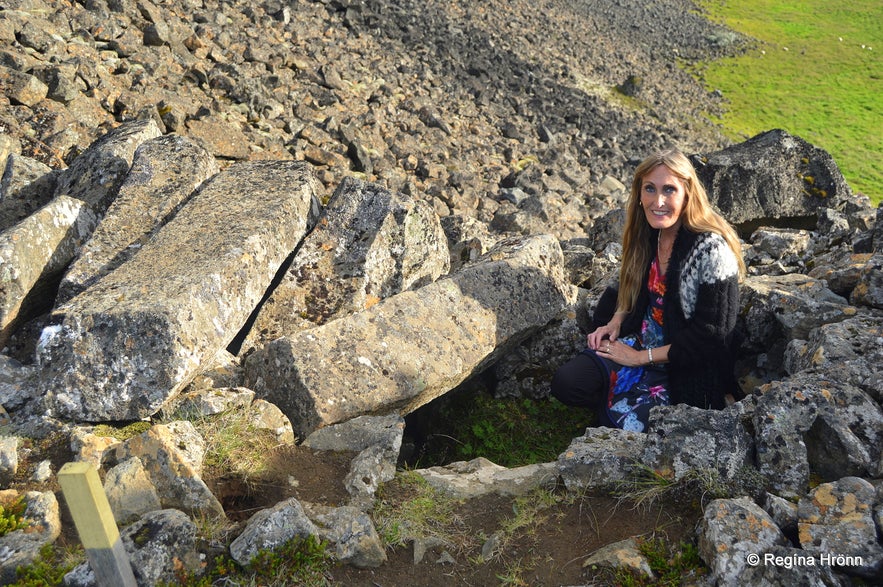 Grettisbæli lair in Mt. Öxarnúpur in northeast Iceland, where Grettir hid for a while
Grettisbæli lair in Mt. Öxarnúpur in northeast Iceland, where Grettir hid for a while
From there, he went south and then wandered about the Eastfjords of Iceland, but nobody would take him in.
I would have loved to know more about the places in which he stayed in the Eastfjords, but the saga doesn't mention them.
From the Eastfjords, he went north and stayed on the heaths of Möðrudalsheiði and Reykjaheiði.
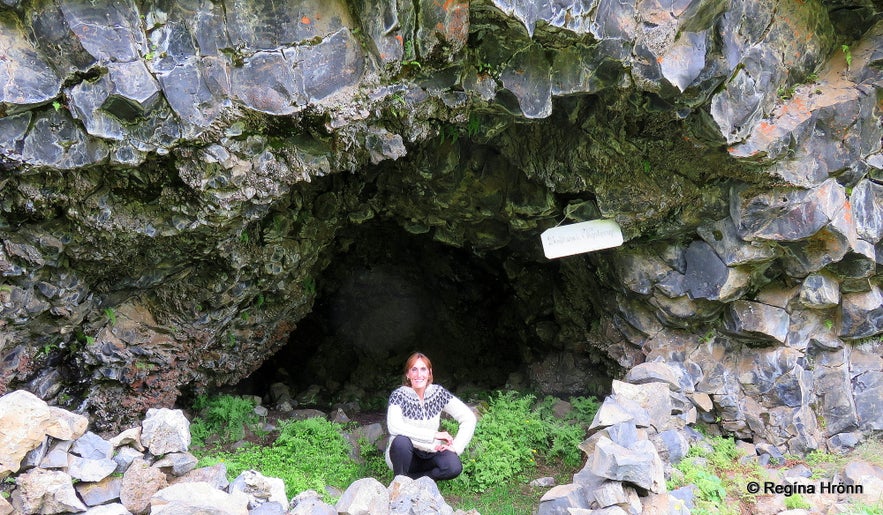 Another Grettisbæli lair in Vígabjarg cliff in Jökulsárgljúfur canyon
Another Grettisbæli lair in Vígabjarg cliff in Jökulsárgljúfur canyon
During this time, he might have stayed in Grettisbæli in Mt. Öxarnúpur and in Grettisbæli in Vígabjarg in the Jökulsársgljúfur canyon, as shown in the photos.
These locations are not mentioned in Grettissaga, but there are stories that passers-by avoided going in front of Mt. Öxarnúpur when Grettir stayed in Grettisbæli, and chose the route behind the mountain.
I have written another travel blog about Grettisbæli in Mt. Öxarnúpur: Grettisbæli - the Lair of the Viking Grettir the Strong in Öxarnúpur in North-East Iceland.
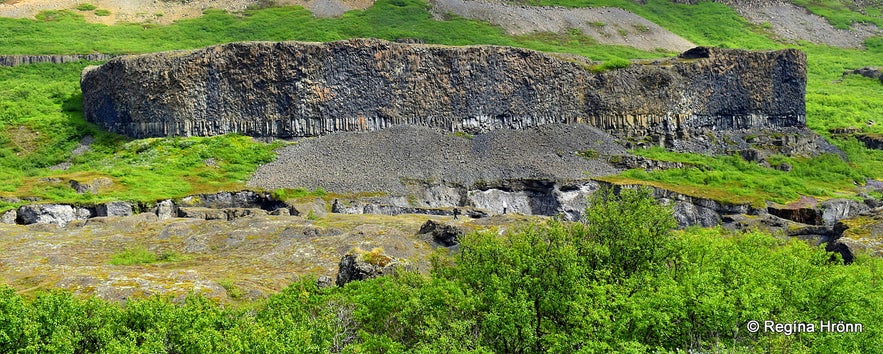 Vígabjarg in Jökulsárgljúfur canyon, where Grettir had a lair
Vígabjarg in Jökulsárgljúfur canyon, where Grettir had a lair
Whenever Þórir found out about the whereabouts of Grettir, he hunted him down. But Grettir managed to evade him and trick him.
One of the places in which he stayed while up north was the Bárðardalur valley, where he had some adventures (chapters 64-66).
Bárðardalur valley was haunted by a troll, who kidnapped people on Christmas Eve.
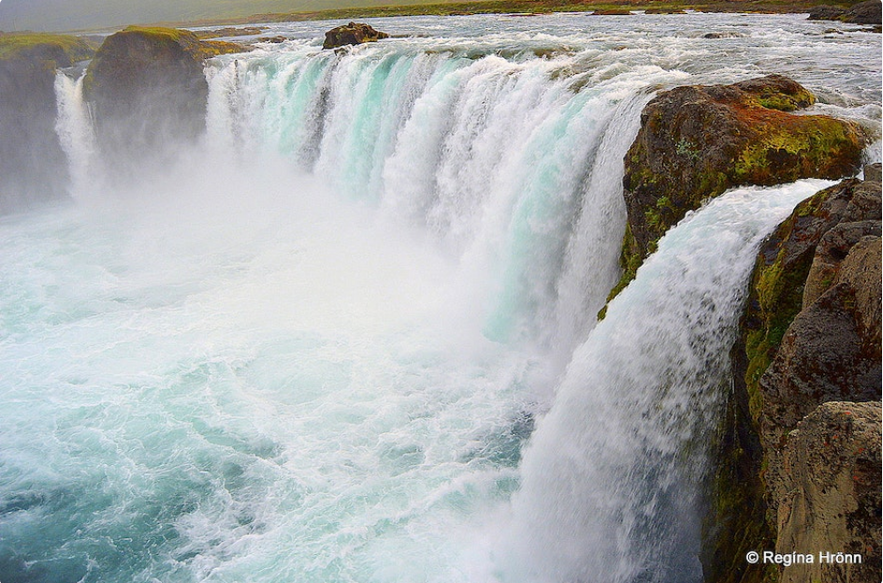
When Grettir heard of the predicaments in the valley, he offered his help, as such things were not unknown to him.
He was in disguise and told them that his name was Gestur. On Christmas Eve, a giantess entered the farm as she had done for the past 2 years. Grettir managed to kill the troll.
You can read about it in my travel blog about the adventures of Grettir in Bárðardalur valley: Grettir the Strong and the Troll in the Waterfall - a Viking Saga from North Iceland
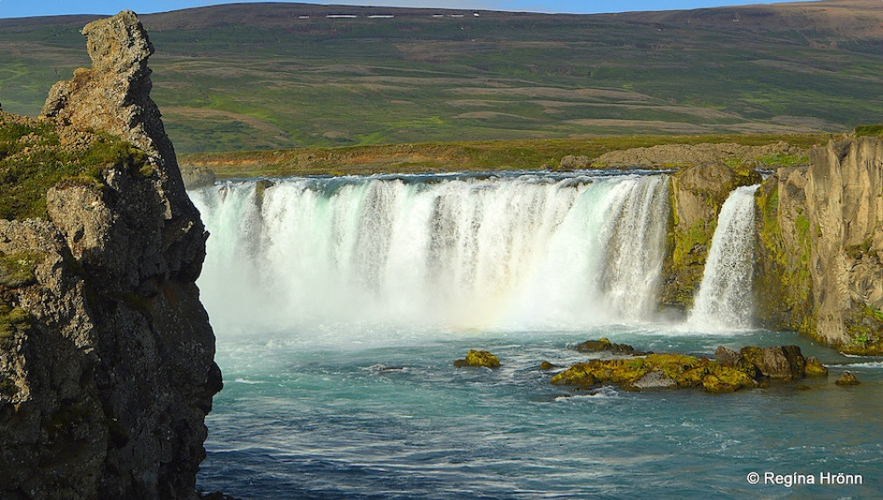
And in Bárðardalur valley, Grettir fathered his only son, Skeggi, or at least the boy resembled him and became the strongest man in North Iceland.
His mother was Steinvör at Sandhaugar farm, with whom Grettir had stayed in Bárðardalur.
Unfortunately, Skeggi died when he was 16 years old, so Grettir doesn't have any descendants, i.e., if Skeggi Steinvararson was in fact his son.
I am a descendant of Grettir's great-grandfather, Ófeigur "grettir" Einarsson, and of Ingimundur gamli, Grettir's great-great-grandfather.
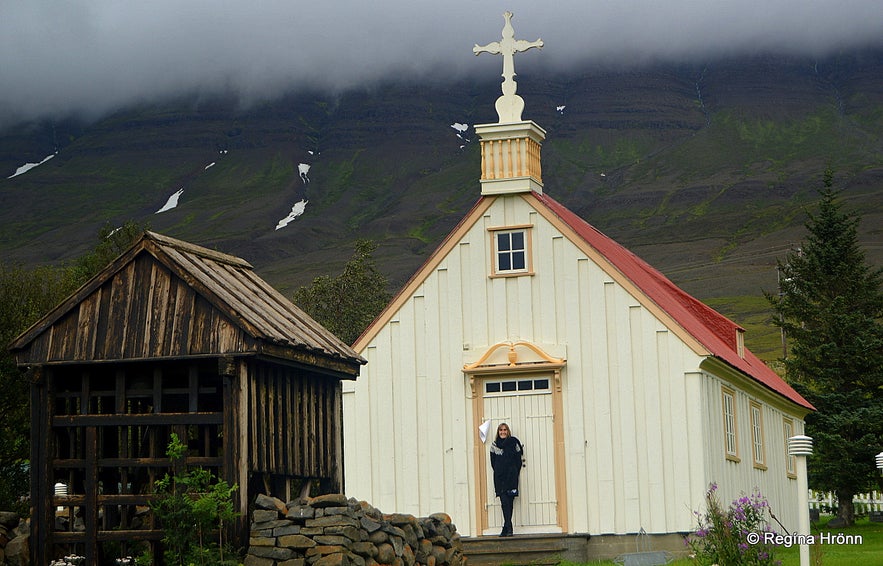 Möðruvellir in Eyjafjörður, where Guðmundur ríki lived
Möðruvellir in Eyjafjörður, where Guðmundur ríki lived
Grettir stayed in Bárðardalur valley for the winter, but when Þórir in Garður heard that Grettir was staying in the valley, Grettir had to leave.
Þórir lived close by in Aðaldalur valley, so Grettir had to flee in haste.
He sought refuge at Möðruvellir in Eyjafjörður - the noted Guðmundur ríki - the rich, lived there. Guðmundur is a very well-known man from the sagas, and you can read about him in Ljósvetninga saga and many other sagas.
He could not help Grettir but told him to hide on Drangey Island.
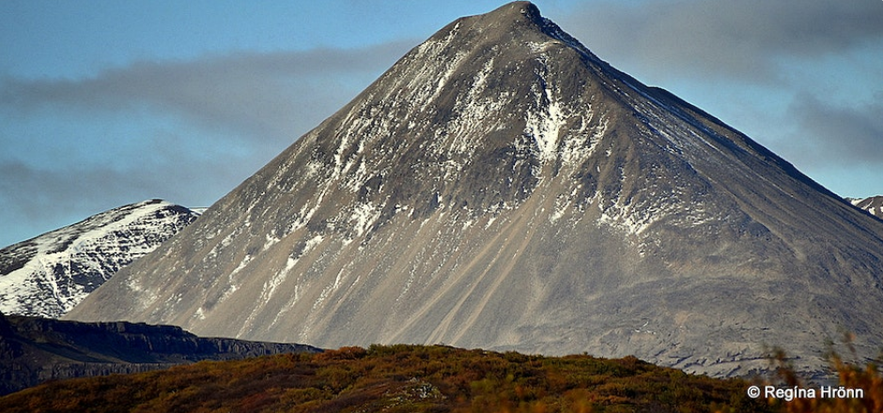
But Grettir feared being alone on this island, which is just a large rock in the sea, so steep that it is only accessible by stairs.
This made it a great fortress, for as long as the stairs were pulled up, nobody could attack Grettir.
Grettir went to Bjarg to greet his mother and stayed at Bröttubrekka in Dalir, West Iceland, for the summer. And again he robbed passers-by and stole livestock from the farmers.
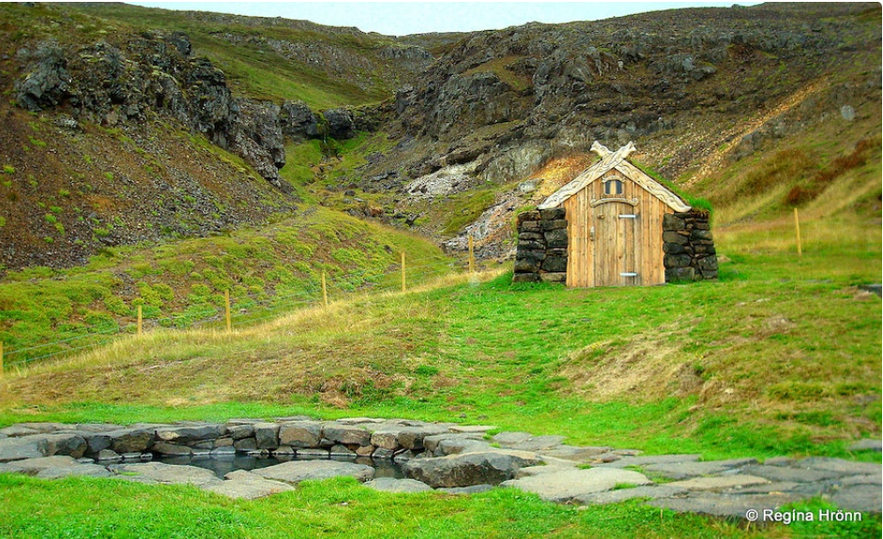
There, Þóroddur Snorrason ventured to kill Grettir to please his father, the noted Chieftain Snorri goði, whom we read about in Eyrbyggja saga and numerous other sagas. Snorri lived in Sælingsdalur valley.
But Grettir, not wanting to kill the son of Snorri goði, talked sense into Þóroddur and told him, after Þóroddur had tried to attack him, that killing Grettir was not child's play. By doing this, he made a friend in Snorri goði, which was a sensible move.
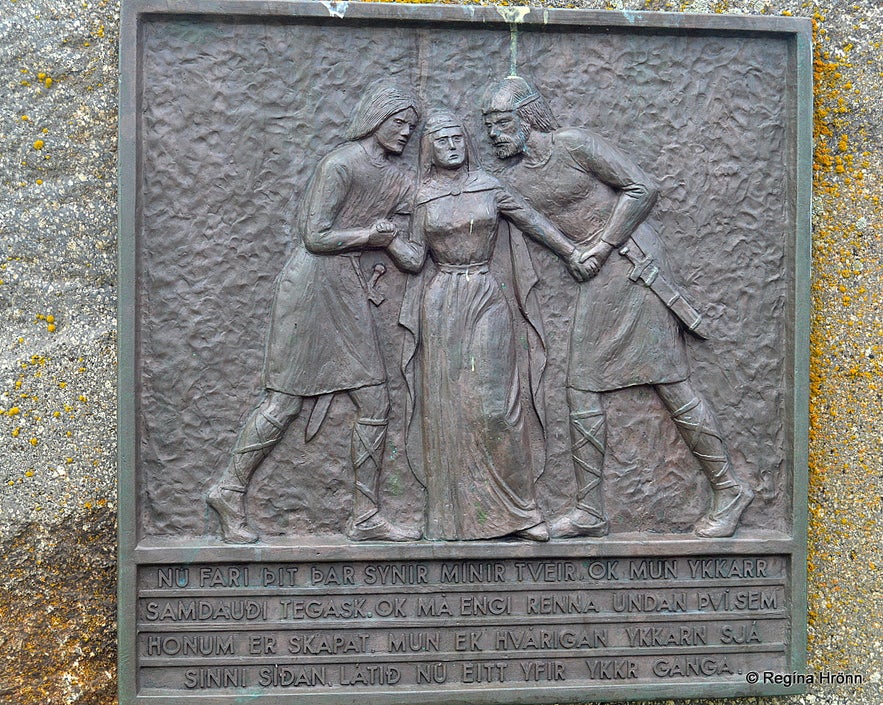 Ásdís at Bjarg says her final farewell to her sons, Grettir and Illugi
Ásdís at Bjarg says her final farewell to her sons, Grettir and Illugi
Now Grettir went to his mother at Bjarg and hid for a while. But hiding in your mother's home was risky, and Grettir had to leave for Drangey.
But he was not alone on Drangey island as his brother, Illugi (15), offered to stay with him, knowing how afraid of the dark Grettir was.
Their brother Atli had been killed at the front door at Bjarg, and now Ásdís had to see her two other sons leave, for good, knowing instinctively that they would be killed together on Drangey island. Her dreams had warned her of this.
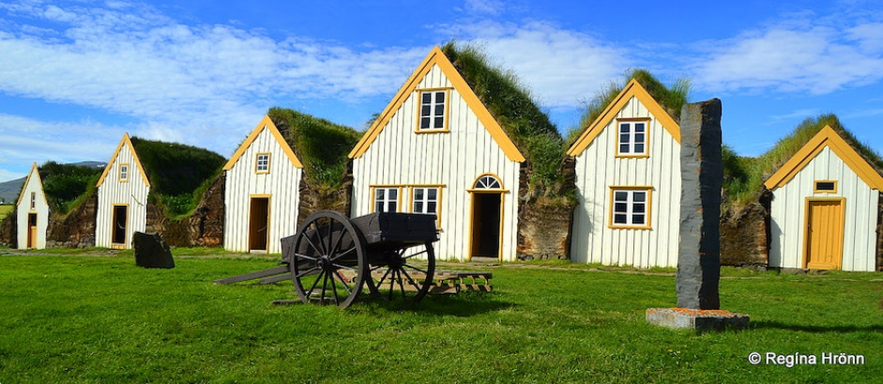
The two brothers went north to stay with their relatives for a while. They then rode to Skagafjörður, where Drangey Island stands tall in the sea.
At Glaumbær farm in Skagafjörður, a man asked if he could stay with them on the island and work for them. This was Þorbjörn glaumur.
His demeanour amused Grettir, and off they went, the three of them to Reykir at Reykjaströnd, from where there is the shortest distance to Drangey Island.
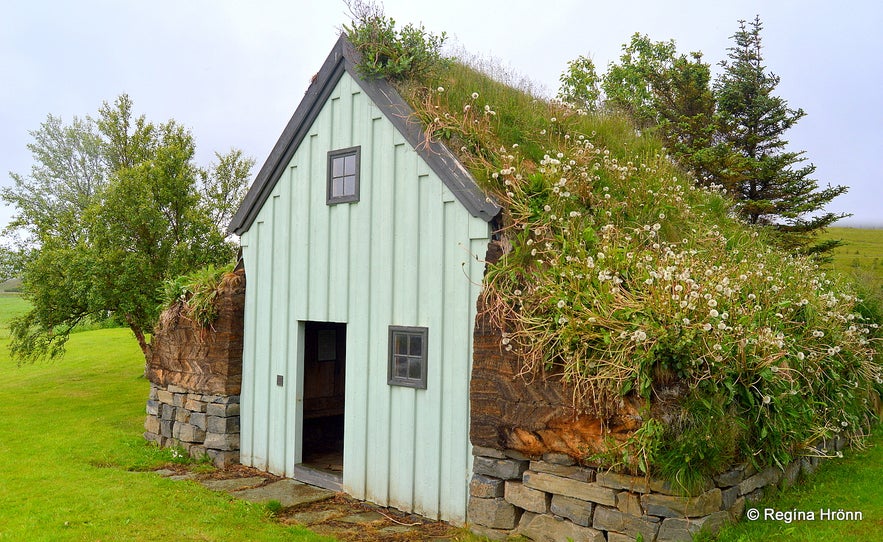 Reynistaður in Skagafjörður
Reynistaður in Skagafjörður
On the way, they stayed for the night at Reynines (now Reynistaður), where the noted Guðríður Þorbjarnardóttir lived. She is believed to have been the most widely-travelled woman in the Middle Ages.
Grettir bribed Þorvaldur the farmer at Reykir with the money he got from his mother and got a boat ride to Drangey Island.
Grettir was killed on Drangey Island
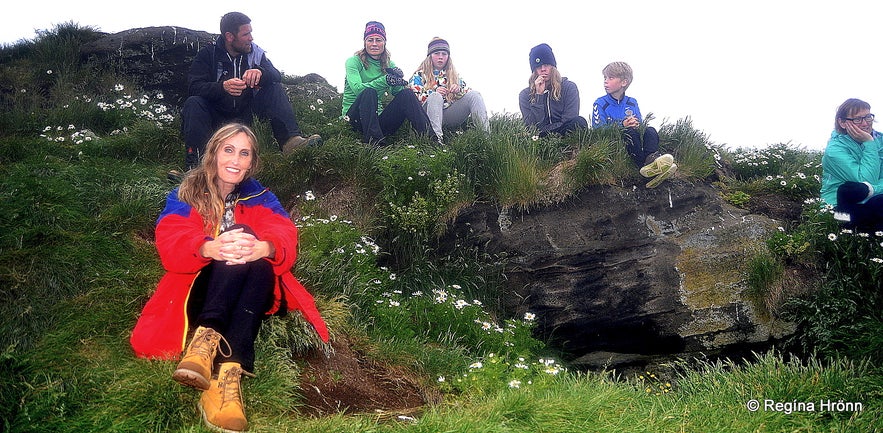 Grettisbæli on Drangey Island in North Iceland in thick fog
Grettisbæli on Drangey Island in North Iceland in thick fog
When Grettir, Illugi, and Glaumur came to Drangey, Grettir had been an outlaw for 15-16 years.
They saw that some 80 sheep were grazing on the island, as this was the grazing land for the sheep of the 20 farmers who owned the island.
Drangey is a bird cliff, so they had plenty to eat on the island in the summertime.
After 2 years, they had eaten all the sheep, but they kept a pet, the ram Hösmagi, whom they found so entertaining that they didn't eat him.
I guess that Hösmagi was a forystusauður - a leader sheep, which is a unique breed of Icelandic sheep.
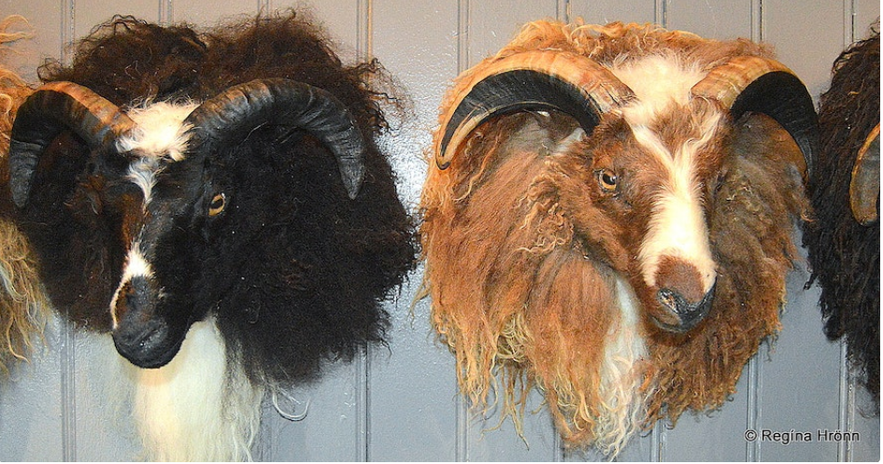
When I visited Drangey, we encountered thick fog, which made our visit quite eerie. We had very little visibility, and by Grettisbæli I sat, listening to the guide, pondering the time Grettir had stayed on this rocky island.
Since I only have foggy photos of the island, I want to show you a video from a reconstruction of Grettisbæli in Drangey.
The island's owners pleaded with Grettir to leave, but he was adamant about staying and keeping their sheep.
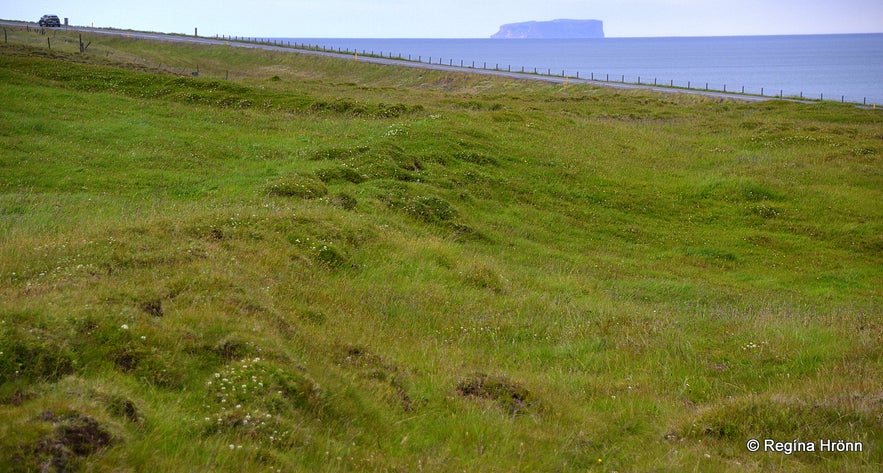 Hegranesþing local assembly - Drangey island in the distance
Hegranesþing local assembly - Drangey island in the distance
And he was even so forward as to attend the Hegranesþing local assembly in disguise, and again he used the name Gestur.
Here, he tricked them into giving him amnesty while he was at the assembly and took part in the wrestling games. And again, the owners of the island pleaded with him to leave, but in vain.
Þorbjörn öngull at Viðvík began buying parts of the island from the other owners, but they sold him their share for a small price on the condition that he would kill Grettir or chase him out of the island.
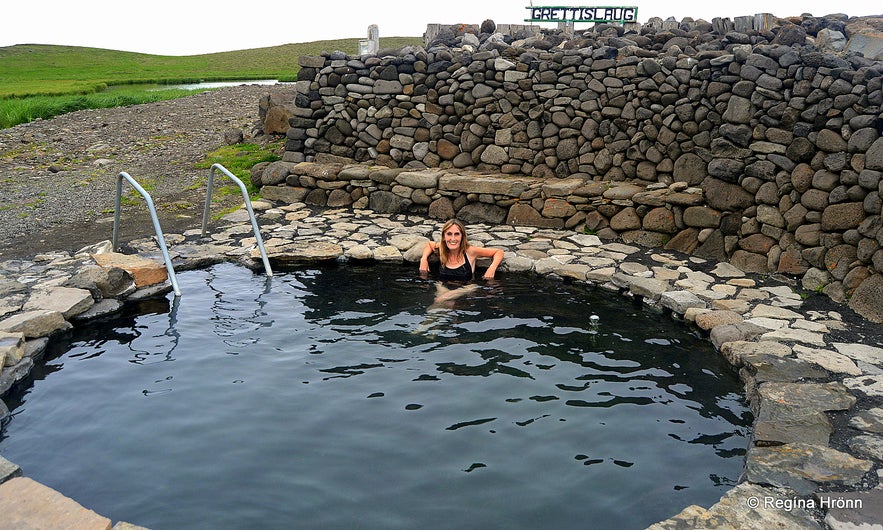 Soaking in Grettislaug at Reykir - a replica of a pool in which Grettir baked after the long swim
Soaking in Grettislaug at Reykir - a replica of a pool in which Grettir baked after the long swim
It once happened that they were without fire on Drangey Island, and Grettir swam ashore to Reykir farm, approximately 7 km away in the cold sea!
When he reached the shore, he baked in the hot geothermal pool at Reykir for a long time to warm up. Þorvaldur at Reykir gave him fire and a lift to Drangey.
Þorbjörn öngull kept pleading with Grettir to leave and managed to send a man to the island to kill Grettir. Illugi killed the man.
At one time, Glaumur didn't pull up the ladder, so the coast was clear for Grettir's enemies to attack Grettir.
A ladder on Drangey Island - it is very steep, and the fog made it even scarier
At that time, Grettir had become very ill from an infection in his foot, which was a result of Grettir chopping up a piece of wood that came ashore.
Þorbjörn's foster mother, Þuríður, cursed the tree, and the axe made a wound in Grettir's leg.
Þuríður had also cursed Grettir on a prior occasion, which startled Grettir immensely.
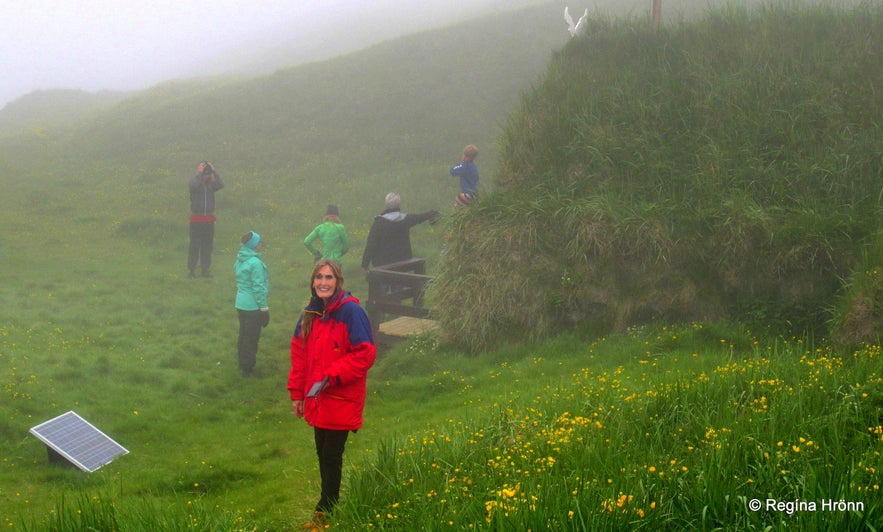 Visiting Drangey island in thick fog at the solstice - we did not see the midnight sun ;)
Visiting Drangey island in thick fog at the solstice - we did not see the midnight sun ;)
Þorbjörn öngull and his men attacked Grettir, who was fatally ill in bed, and killed him.
Þorbjörn cut his head off with Grettir's own sword as proof and presented it to his mother Ásdís at Bjarg.
Illugi, Grettir's brother, was also killed as he refused to make an oath not to avenge Grettir.
I have written more about Grettir in Drangey in my travel blog: Drangey Bird Cliff in North Iceland and the Viking Grettir the Strong.
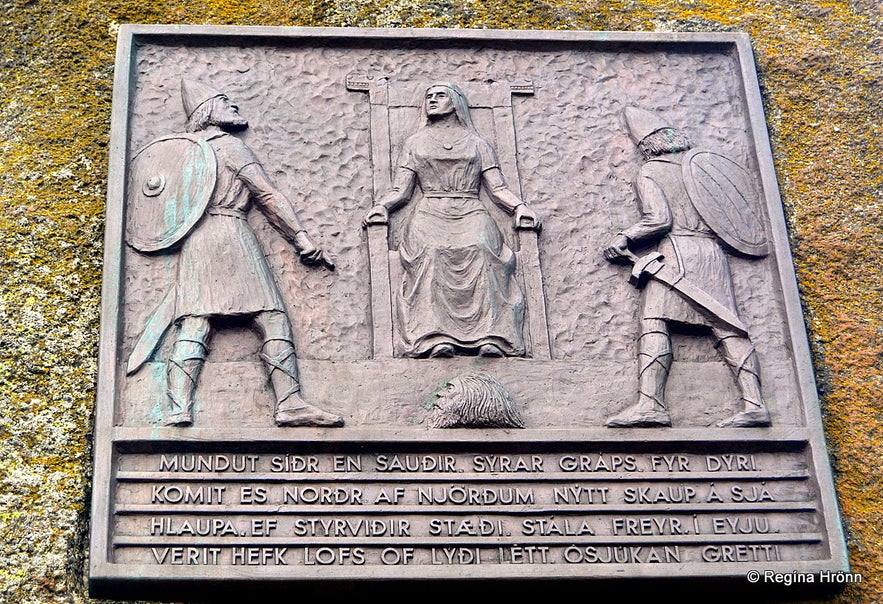 Þorbjörn öngull threw Grettir's head in front of his mother at Bjarg :( Memorial at Bjarg
Þorbjörn öngull threw Grettir's head in front of his mother at Bjarg :( Memorial at Bjarg
It isn't easy to read this part of Grettissaga, as we root for Grettir and Illugi.
Grettir was 44 when this happened, and his brother Illugi was only 18. Grettir had been an outlaw since he was only 25.
Þorbjörn öngull was accused at Alþingi of having used sorcery to kill Grettir and of having killed him while he was fatally wounded. He was banished from Iceland for this terrible act.
Skeggi, Grettir's nephew, fetched the bodies of Grettir and Illugi and buried them by the church at Reykir, but Grettir's head was buried by the church at his home, Bjarg.
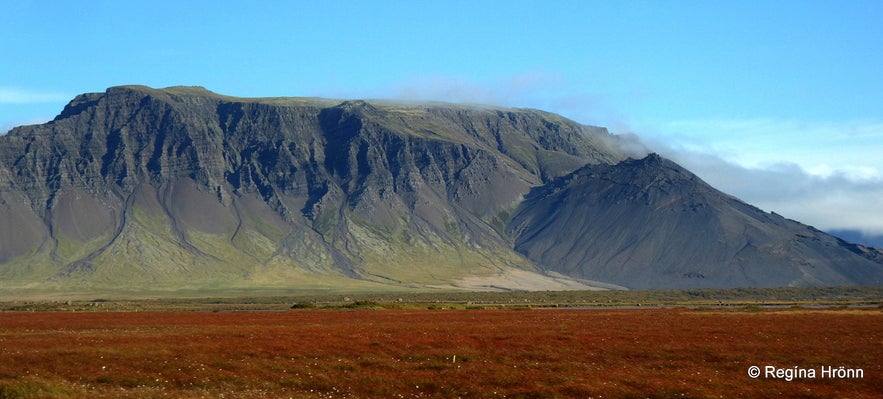 Mt. Fagraskógarfjall and Grettisbæli - photo taken in 2022
Mt. Fagraskógarfjall and Grettisbæli - photo taken in 2022
In Íslendingabók, Grettir is said to have lived around 996-1040, and in Grettissaga, he is said to have been 44 years old when he was killed.
But the Grettissaga also states that Snorri goði died while Grettir was on Drangey island. Snorri died in 1030. So, what is the correct year of the death of Grettir?
This travel blog has almost turned into a book, and I have only told you some of the highlights of Grettir's life. Sorry about this, I am just a big fan of the sagas :)
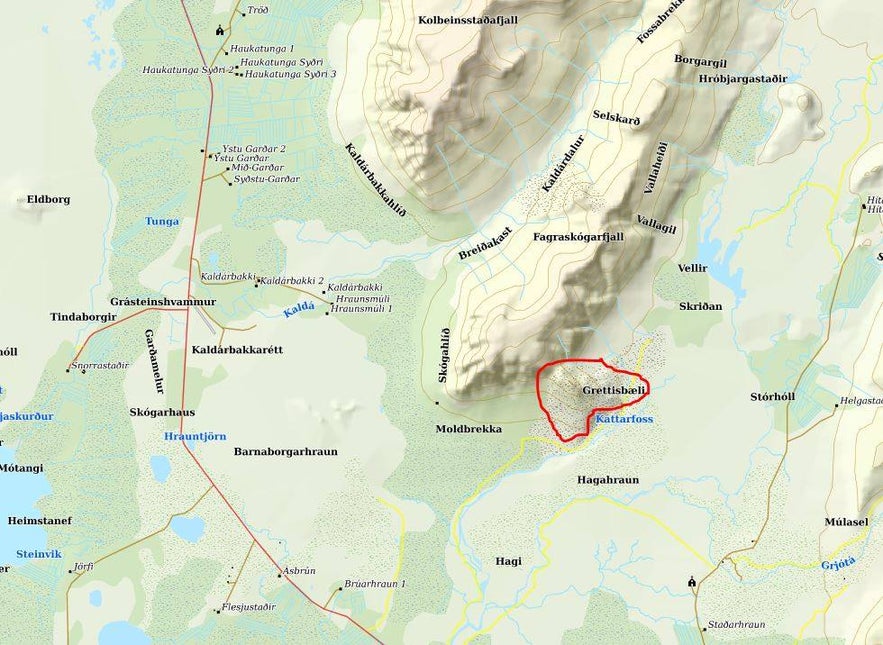 Grettisbæli in Hítardalur valley
Grettisbæli in Hítardalur valley
Next summer, I am going to hike on Grettisbæli in Hítardalur with my husband and my father-in-law and take my own photos of Grettisbæli. I am not much of a mountain hiker, but they promised to push me up the mountain :)
Here are the links to my other travel blogs about Grettir and his lairs:
Grettisbæli - the Lair of the Viking Grettir the Strong in Öxarnúpur in North East Iceland
Drangey Bird Cliff in North Iceland and the Viking Grettir the Strong
Grettir the Strong and the Troll in the Waterfall - a Viking Saga from North Iceland
I highly recommend reading the story about Grettir the Strong. Have a lovely time in Iceland :)
Ref.:
Grettissaga (Icelandic version) - the Saga of Grettir (English version)
Þjóðsögur Jóns Árnasonar - II (bls. 97-99)

